小学3-6年级英语知识点归纳
人教版小学3-6年级英语教材中的连读,略读,弱读和同化
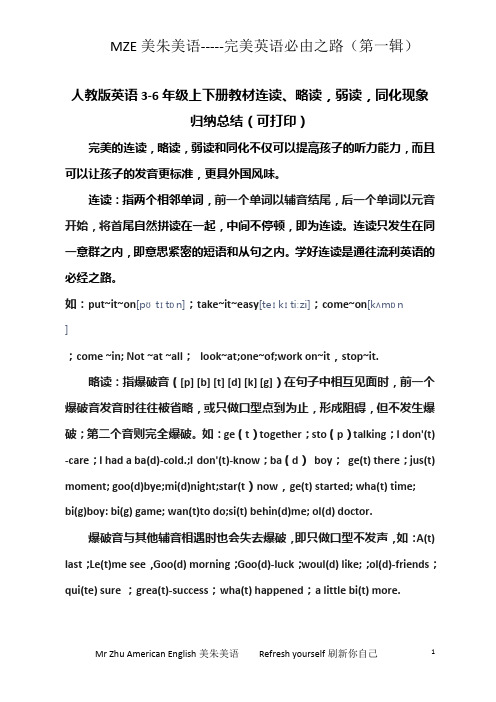
人教版英语3-6年级上下册教材连读、略读,弱读,同化现象归纳总结(可打印)完美的连读,略读,弱读和同化不仅可以提高孩子的听力能力,而且可以让孩子的发音更标准,更具外国风味。
连读:指两个相邻单词,前一个单词以辅音结尾,后一个单词以元音开始,将首尾自然拼读在一起,中间不停顿,即为连读。
连读只发生在同一意群之内,即意思紧密的短语和从句之内。
学好连读是通往流利英语的必经之路。
如:put~it~on[pʊ tɪ tɒn];take~it~easy[teɪ kɪ tiːzi];come~on[kʌmɒn];come ~in; Not ~at ~all;look~at;one~of;work on~it,stop~it.略读:指爆破音([p] [b] [t] [d] [k] [g])在句子中相互见面时,前一个爆破音发音时往往被省略,或只做口型点到为止,形成阻碍,但不发生爆破;第二个音则完全爆破。
如:ge(t)together;sto(p)talking;I don'(t) -care;I had a ba(d)-cold.;I don'(t)-know;ba(d)boy;ge(t) there;jus(t) moment; goo(d)bye;mi(d)night;star(t)now,ge(t) started; wha(t) time;bi(g)boy: bi(g) game; wan(t)to do;si(t) behin(d)me; ol(d) doctor.爆破音与其他辅音相遇时也会失去爆破,即只做口型不发声,如:A(t) last;Le(t)me see,Goo(d) morning;Goo(d)-luck;woul(d) like;;ol(d)-friends;qui(te) sure;grea(t)-success;wha(t) happened;a little bi(t) more.弱读:英语在建构句子的时候,会用到一些在语法结构上必须存在但是却没有确切意义的词汇,如冠词,介词,连词,助动词等。
小学英语三至六年级知识点归纳
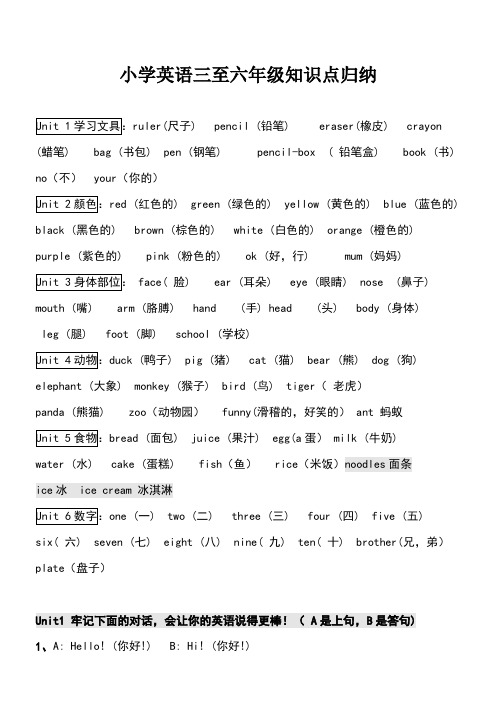
小学英语三至六年级知识点归纳ruler(尺子) pencil (铅笔) eraser(橡皮) crayon(蜡笔) bag (书包) pen (钢笔) pencil-box ( 铅笔盒) book (书) no(不) your(你的)red (红色的) green (绿色的) yellow (黄色的) blue (蓝色的) black (黑色的) brown (棕色的) white (白色的) orange (橙色的)purple (紫色的) pink (粉色的) ok (好,行) mum (妈妈)face( 脸) ear (耳朵) eye (眼睛) nose (鼻子)mouth (嘴) arm (胳膊) hand (手) head (头) body (身体)leg (腿) foot (脚) school (学校)duck (鸭子) pig (猪) cat (猫) bear (熊) dog (狗)elephant (大象) monkey (猴子) bird (鸟) tiger(老虎)panda (熊猫) zoo(动物园) funny(滑稽的,好笑的) ant 蚂蚁bread (面包) juice (果汁) egg(a蛋) milk (牛奶)water (水) cake (蛋糕) fish(鱼) rice(米饭)noodles面条ice冰 ice cream 冰淇淋one (一) two (二) three (三) four (四) five (五)six( 六) seven (七) eight (八) nine( 九) ten( 十) brother(兄,弟)plate(盘子)Unit1 牢记下面的对话,会让你的英语说得更棒!( A是上句,B是答句)1、A: Hello! (你好!) B: Hi! (你好!)2、A:What’s your name?你叫什么名字?B:My name’s Chen Jie.我的名字是陈洁。
人教版pep小学英语3至6年级知识点归纳
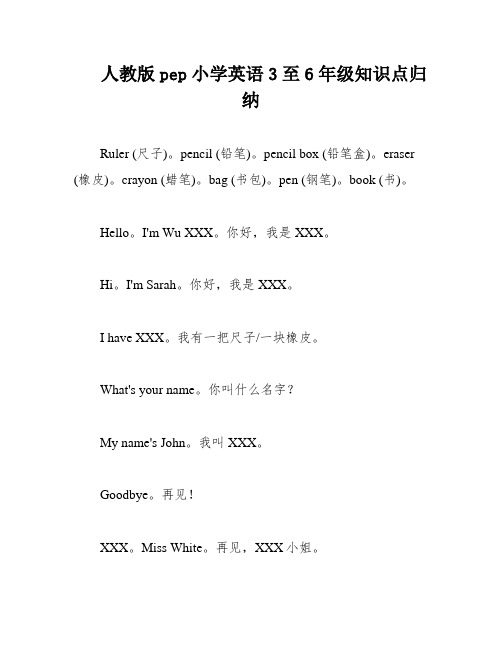
人教版pep小学英语3至6年级知识点归纳Ruler (尺子)。
pencil (铅笔)。
pencil box (铅笔盒)。
eraser (橡皮)。
crayon (蜡笔)。
bag (书包)。
pen (钢笔)。
book (书)。
Hello。
I'm Wu XXX。
你好,我是XXX。
Hi。
I'm Sarah。
你好,我是XXX。
I have XXX。
我有一把尺子/一块橡皮。
What's your name。
你叫什么名字?My name's John。
我叫XXX。
Goodbye。
再见!XXX。
Miss White。
再见,XXX小姐。
Red (红色的)。
green (绿色的)。
yellow (黄色的)。
blue (蓝色的)。
black (黑色的)。
brown (棕色的)。
white (白色的)。
orange (橙色的)。
Mr。
Jones。
this is Miss Green.琼斯先生,这是XXX小姐。
Good morning。
Miss Green。
早上好,XXX小姐。
I see red。
我看见红色。
Good XXX。
Wu XXX。
下午好,XXX。
Nice to meet you。
见到你很高兴。
Nice to meet you。
too。
见到你也很高兴。
Colour it brown。
把它涂成棕色吧!Face (脸)。
ear (耳朵)。
eye (眼睛)。
nose (鼻子)。
mouth (嘴)。
arm (胳膊)。
hand (手)。
head (头)。
body (身体)。
leg (腿)。
foot (脚)。
How are you。
你好吗?I'm fine。
thank you。
我很好,谢谢你。
Let's go to school。
我们一起上学吧!Look at me。
看我!Very well。
thanks。
很好,谢谢。
Let's make a puppet。
让我们一起做个木偶吧!Great。
人版小学pep英语[三年级起点]六年级(上册)知识点归纳
![人版小学pep英语[三年级起点]六年级(上册)知识点归纳](https://img.taocdn.com/s3/m/d93d57ae195f312b3169a59f.png)
Unit1 How can I get there? 我怎样到达这里?重点单词:where哪里 how 怎样 can能够 near近的 ask问 tell 告诉 far远的science科学 hospital 医院 museum 博物馆 postoffice 邮局library图书馆 bookstore 书店 usually通常 sometimes有时候 often 经常know知道 near旁边 next to旁边(比near更近) crossing 十字路口turn left 向左转 turn right 向右转 go straight直走in front of在…的前面 behind在...的后面重点句子:1.How do you go to school? 你是怎样去上学的?2.where is the restaurant? 餐馆在哪里?ually I go to school on foot.我通常走路去上学。
4.Sometimes I go by bike.有时候我骑自行车去。
、5.问路之前;出于礼貌;我们要说“Excuse me.”与后面的句子要用标点符号隔开。
6.Look at the traffic lights; remember the trafficrules.看着交通灯;记住交通规则。
7.Stop at a red light.Wait at a yellow light.Go at agreen light.红灯停。
黄灯等一等。
绿灯行。
8.Red means stop; yellow means wait; green means go.红色的意思是停止;黄色的意思是等待;绿色的意思是通行。
9.How can I get to the park? 我该怎样到达公园呢?10.You can go by the No.15 bus.你可以坐15路公交车去。
重点知识:1.坐某种交通工具用by;例如:by bike; by train。
Excel背单词:人教版PEP小学英语3-6年级

70 71 72 73 74 75 76 77 78 79 80 81 82 83 84 85 86 87 88 89 90 91 92 93 94 95 96 97 98 99 100 101 102 103 104 105
B B B B B B B B B B B C C C C C C C C C C C C C C C C C C C C C C C C C
Australia baby bag ball balloon banana bank bathroom bear beautiful because become bed bedroom beef behind best better between big bigger bike bird birthday black blue board boat body book bookstore boots bored bounce boy bread
358 359 360 361 362 363 364 365 366 367 368 369 370 371 372 373 374 375 376 377 378 379 380 381 382 383 384 385 386 387 388 389 390 391 392 393
I I I I I I I I I J J J J J J J J J J K K K K K K K ຫໍສະໝຸດ K K K L L L L L L
Excel背单词:人教版PEP小学英语3-6年级单
序号 1 2 3 4 5 6 7 8 9 10 11 12 13 14 15 16 17 18 19 20 21 22 23 24 25 26 27 28 29 30 31 32 33 首字母 A A A A A A A A A A A A A A A A A A A A A A A A A A A A A A A A A a little a pair of able about accountant active actor actress after school again air air-conditioner all right always and angry another answer the phone ant any apple April are aren’t =are not arm art art room artist assistant at at home August aunt 英文
苏教译林版小学英语3-6年级知识点总结
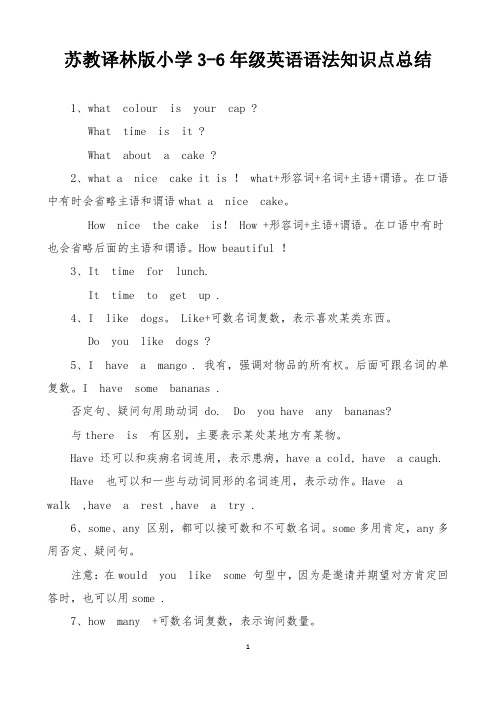
苏教译林版小学3-6年级英语语法知识点总结1、what colour is your cap ?What time is it ?What about a cake ?2、what a nice cake it is ! what+形容词+名词+主语+谓语。
在口语中有时会省略主语和谓语what a nice cake。
How nice the cake is! How +形容词+主语+谓语。
在口语中有时也会省略后面的主语和谓语。
How beautiful !3、It time for lunch.It time to get up .4、I like dogs。
Like+可数名词复数,表示喜欢某类东西。
Do you like dogs ?5、I have a mango . 我有,强调对物品的所有权。
后面可跟名词的单复数。
I have some bananas .否定句、疑问句用助动词 do. Do you have any bananas?与there is 有区别,主要表示某处某地方有某物。
Have 还可以和疾病名词连用,表示患病,have a cold, have a caugh.Have 也可以和一些与动词同形的名词连用,表示动作。
Have awalk ,have a rest ,have a try .6、some、any 区别,都可以接可数和不可数名词。
some多用肯定,any多用否定、疑问句。
注意:在would you like some 句型中,因为是邀请并期望对方肯定回答时,也可以用some .7、how many +可数名词复数,表示询问数量。
8、 What would you like ?或 would you like ……?表示礼貌征求别人意见或建议。
What would you like for breakfast?Would you like some apple juice ?(juice不可数,所以用some )9、how much is it ? 意思是多少钱?如果物品是复数,how much are they10、what subject do you like ?What lessons do you have today ?11、when do you go to school ?对时间提问。
三至六年级的重点英语单词

三至六年级的重点英语单词三至六年级是学习英语的关键阶段。
在这个阶段,学生将学习更多的单词,并开始构建句子和进行简单的对话。
以下是三至六年级重点英语单词的详细介绍。
三年级重点英语单词:1. apple - 苹果2. book - 书3. cat - 猫4. dog - 狗5. elephant - 大象6. fish - 鱼7. girl - 女孩8. hat - 帽子9. ice cream - 冰淇淋10. juice - 果汁11. key - 钥匙12. lion - 狮子13. mouse - 鼠标14. nose - 鼻子15. orange - 橙子16. pen - 钢笔17. queen - 女王18. rabbit - 兔子19. sun - 太阳20. tiger - 老虎21. umbrella - 雨伞22. violin - 小提琴23. window - 窗户24. xylophone - 木琴25. yellow - 黄色26. zoo - 动物园27. bird - 鸟28. car - 汽车29. dinosaur - 恐龙30. flower - 花31. house - 房子32. moon - 月亮33. pencil - 铅笔34. rainbow - 彩虹35. star - 星星36. table - 桌子37. tree - 树38. boat - 船39. cake - 蛋糕40. chair - 椅子四年级重点英语单词:1. brother - 兄弟2. classroom - 教室3. door - 门4. friend - 朋友5. garden - 花园6. happy - 开心的7. jump - 跳跃8. key - 钥匙9. laugh - 笑10. mother - 母亲11. pencil case - 铅笔盒12. river - 河13. sun - 太阳14. tiger - 老虎15. umbrella - 雨伞16. violin - 小提琴17. window - 窗户18. xylophone - 木琴19. yellow - 黄色20. zoo - 动物园21. bird - 鸟22. car - 汽车23. dinosaur - 恐龙24. flower - 花25. house - 房子26. moon - 月亮27. pencil - 铅笔28. rainbow - 彩虹29. star - 星星30. table - 桌子31. tree - 树32. boat - 船33. cake - 蛋糕34. chair - 椅子35. computer - 电脑36. dog - 狗37. elephant - 大象38. fish - 鱼39. girl - 女孩40. hat - 帽子五年级重点英语单词:1. breakfast - 早餐2. computer - 电脑3. dinner - 晚餐4. explore - 探索5. football - 足球6. garden - 花园7. homework - 家庭作业8. language - 语言9. music - 音乐10. school - 学校11. science - 科学12. soccer - 足球13. technology - 技术14. tennis - 网球15. vacation - 假期16. art - 艺术17. ballet - 芭蕾舞18. basketball - 篮球19. biology - 生物20. chemistry - 化学21. guitar - 吉他22. history - 历史23. library - 图书馆24. mathematics - 数学25. painting - 绘画26. physics - 物理27. swimming - 游泳28. volcano - 火山29. waterfall - 瀑布30. wildlife - 野生动植物31. microscope - 显微镜32. telescope - 望远镜33. bicycle - 自行车34. aeroplane - 飞机35. spaceship - 宇宙飞船36. earthquake - 地震37. hurricane - 飓风38. meteorology - 气象学39. geography - 地理学40. architecture - 建筑学六年级重点英语单词:1. airport - 机场2. bicycle - 自行车3. city - 城市4. family - 家庭5. holiday - 假期6. introduce - 介绍7. library - 图书馆8. picture - 图片9. restaurant - 餐厅10. travel - 旅行11. apartment - 公寓12. beach - 海滩13. climate - 气候14. culture - 文化15. economics - 经济学16. education - 教育17. festival - 节日18. gallery - 画廊19. health - 健康20. internet - 互联网21. job - 工作22. mountain - 山23. newspaper - 报纸24. ocean - 海洋25. park - 公园26. planet - 行星27. recipe - 食谱28. safety - 安全29. shopping - 购物30. society - 社会31. sport - 运动32. technology - 技术33. theatre - 剧院34. tour - 旅游35. weather - 天气36. wildlife - 野生动植物37. zoo - 动物园38. adventure - 冒险39. career - 职业40. challenge - 挑战总结:通过学习以上重点英语单词,三至六年级的学生将能够扩展他们的词汇量,提高他们的英语水平。
译林版小学英语三年级全册知识点总结(全)

Unit 1 Hello一、基础单词1. 基础词汇class hello higood morning afternoonam evening nightMiss Mr Mrs 太太、夫人Bobby Sam dear2. 拓展词汇meet 见面name 名字fine 好的二、基础短语I’m=I am 我是my dear friend 我亲爱的朋友三、句型。
基础句子1.Good morning,Miss Li.早上好,李老师。
2. Good afternoon,class.下午好,同学们。
3. Hi,I’m Bobby.你好,我是波比。
4.Good night, my dear.晚安,我亲爱的。
拓展句子1.----How do you do?你好。
(初次见面)----How do you do?你好。
2.---- Nice to meet you.很高兴见到你。
(初次见面)---- Nice to meet you,too我也很高兴见到你。
3.----How are you?你好吗?(重逢时)----I’m fine.我很好。
4.----what’s your name?你叫什么名字?----My name is Mike.我的名字叫麦克。
Unit 2 I’m Liu Tao一、单词1. 基础词汇are you yesam no notgoodbye John Moeright正确的2. 拓展词汇night 夜晚my我的name名字or或者evening夜晚what 什么二、句型。
基础句子。
1.----Are you Su Hai?你是苏海吗?----Yes ,I am.是的,我是。
(这里的I am不可以连写成I’m)----No, I’m not=No, I am not.2. I’m Liu Tao.我是刘涛。
拓展句子。
1.----Are you a doctor?你是一名医生吗?---- Yes , I am./ No, I am not.是的,我是。
小学英语1-6年级要点知识点汇总(背熟期末考满分)

小学英语1-6年级要点知识点汇总(背熟期末考满分)第一部分:基础知识1.字母:26个字母的大小写ABCDEFGHIJKLMNOPQRSTUVWXYZabcdefghijklmnopqrstuvwxyz2.语音:元音的发音五个元音字母:AEIOU12个单元音:前元音:[i:] [ɪ] /e/ [æ]中元音:[ɜ:] [ə]后元音:[ɑ:] [ɒ] [ɔ:] [u :] [ʊ] [ʌ]双元音(8个)Ⅰ.合口双元音(5个)[ai] [ei] [au] [əu] [ɔi]Ⅱ.集中双元音(3个)[iə][εə][uə]3.词汇:词汇量,近反义词4.句子:大小写,标点符号第二部分:语法知识(1)一.名词:名词单复数,名词的格(一)名词单复数1.一般情况,直接加-s,如:book-books, bag-bags, cat-cats, bed-beds2.以s. x. sh. ch结尾,加-es,如:bus-buses, box-boxes, brush-brushes, watch-watches3.以“辅音字母+y”结尾,变y为i, 再加-es,如:family-families, strawberry-strawberries4.以“f或fe”结尾,变f或fe为v, 再加-es,如:knife-knives5.不规则名词复数:man-men, woman-women, policeman-policemen, policewoman-policewomen, mouse-mice child-children, foot-feet, tooth-teeth, fish-fish, people-people, Chinese-Chinese, Japanese-Japanese不可数名词的复数就是原型:paper, juice, water, milk, rice, tea(二)名词的格(1) 有生命的东西的名词所有格:a) 单数后加’s 如: Lucy’s ruler my father’s shirtb) 以s 结尾的复数名词后加’如: his friends’bagsc) 不以s 结尾的复数后加’s children’s shoesl并列名词中,如果把’s加在最后一个名词后,表示共有, 如:Tom and Mike’s car 汤姆和迈克共有的小汽车l要表示所有物不是共有的,应分别在并列名词后加’sTom’s and Mike’s cars 汤姆和麦克各自的小汽车(2)表示无生命东西的名词通常用“of +名词”来表示所有关系:如:a picture of the classroom a map of China第二部分:语法知识(2)二.冠词:不定冠词,定冠词种类:(1)不定冠词:a / an a unit / an uncle元音开头的可数名词前用an :an egg / an apple / an orange / an eraser / an answer / an ID card / an alarm clock / an actor / an actress / an e-mail / an address / an event / an example / an opera / an houran old man / an interesting book / an exciting sport / an action movie / an art lesson /(2)定冠词:the the egg the plane2. 用法:定冠词的用法:(1)特指某(些)人或某(些)物:The ruler is on the desk.(2)复述上文提到的人或物:He has a sweater. The sweater is new.(3)谈话双方都知道的人或物:The boys aren’t at school.(4)在序数词前:John’s birthday is February the second.(5)用于固定词组中:in the morning / afternoon / evening不用冠词的情况:(1)专有名词前:China is a big country.(2)名词前有定语:this , that , my , your , some, any , no 等:This is my baseball.(3)复数名词表示一类人和事:Monkeys can’t swim. They are teachers.(4)在节日,日期,月份,季节前:Today is Christmas Day. It’s Sunday.(5)一日三餐前:We have breakfast at 6:30.(6)球类棋类运动前:They often play football after class. He plays chess at home.* 但乐器前要用定冠词:I play the guitar very well.(7)学科名称前:My favorite subject is music.(8)在称呼或头衔的名词前:This is Mr Li.(9)固定词组中:at noon at night by bus第二部分:语法知识(3)三、代词、形容词、副词代词:人称代词,物主代词人称代词物主代词主格宾格第一人称单数I(我)memy(我的)复数we(我们)usour(我们的)第二人称单数you(你)youyour(你的)复数you(你们)youyour(你们的)第三人称单数he(他)himhis(他的)she(她)herher(她的)it(它)itits(它的)复数they(他们/她们/它们)themtheir(他们的/她们的/它们的)形容词,副词:比较级,最高级(一)、形容词的比较级1、形容词比较级在句子中的运用:两个事物或人的比较用比较级,比较级后面一般带有单词than。
2023年精通版小学英语3-6年级下册各单元知识点归纳汇总

精通版小学英语3-6年级下册各单元知识点归纳汇总三年级下册Unit Let’s go to school.一、核心词汇school 学校classroom 教室textbook 课本storybook 故事书Chinese book 语文书English book 英语书exercise book 练习本notebook 笔记本desk 课桌chair 椅子二、了解词汇nice 令人愉快的see 看见again 又,此外,再一次glad高兴的guess猜look 看new 新的三、核心句型1. Let’s go to school. 咱们去上学吧。
解读:这是表示提出建议的句子。
举一反三: Let’s go to the classroom. 咱们去教室吧。
Let’s have a talk. 咱们谈一谈吧。
2. I have a new textbook. 我有一本新课本。
解读:这是一个表示我有某物的句型。
举一反三: I have a new storybook. 我有一本新故事书。
I have an old English book. 我有一本旧英语书。
3. What’s in my bag? 我的书包里面有什么?解读:这是一个询问某物里面有什么的句型。
举一反三: —What’s in your hand?你的手里有什么?— A Chinese book and an English book. 一本语文书和一本英语书。
—What’s in my pencil-box? 我的铅笔盒里面有什么?—Some pencils. 一些铅笔。
4. What’s on the chair? 椅子上面有什么?解读:这是一个询问某物上面有什么的句型。
举一反三: What’s on the bed?床上面有什么?What’s on my desk?我的课桌上面有什么?四、了解句型1. Nice to see you again. 很高兴再次见到你。
(完整版)新版PEP小学英语(3-6年级)单词表--打印
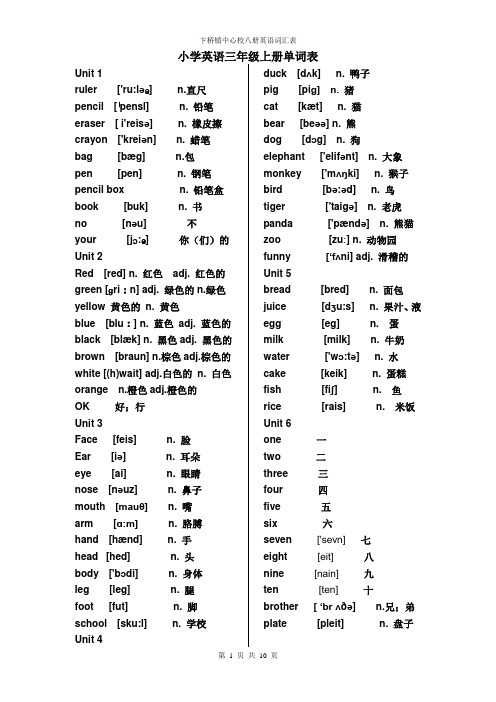
小学英语三年级上册单词表Unit 1ruler ['ru:ləə] n.直尺pencil [ˈpensl] n. 铅笔eraser [ i'reisə] n. 橡皮擦crayon ['kreiən] n. 蜡笔bag [bæg] n.包pen [pen] n. 钢笔pencil box n. 铅笔盒book [buk] n. 书no [nəu] 不your [jɔ:ə] 你(们)的Unit 2Red [red] n. 红色adj. 红色的green [ɡriːn] adj. 绿色的n.绿色yellow 黄色的n. 黄色blue [bluː] n. 蓝色adj. 蓝色的black [blæk] n. 黑色adj. 黑色的brown [braun] n.棕色adj.棕色的white [(h)wait] adj.白色的n. 白色orange n.橙色adj.橙色的OK 好;行Unit 3Face [feis] n. 脸Ear [iə] n. 耳朵eye [ai] n. 眼睛nose [nəuz] n. 鼻子mouth [mauθ] n. 嘴arm [ɑ:m] n. 胳膊hand [hænd] n. 手head [hed] n. 头body ['bɔdi] n. 身体leg [leg] n. 腿foot [fut] n. 脚school [sku:l] n. 学校Unit 4 duck [dʌk] n. 鸭子pig [piɡ] n. 猪cat [kæt] n. 猫bear [beəə] n. 熊dog [dɔg] n. 狗elephant ['elifənt] n. 大象monkey ['mʌŋki] n. 猴子bird [bə:əd] n. 鸟tiger ['taigə] n. 老虎panda ['pændə] n. 熊猫zoo [zuː] n. 动物园funny [‘fʌni] adj. 滑稽的Unit 5bread [bred] n. 面包juice [dʒu:s] n. 果汁、液egg [eg] n. 蛋milk [milk] n. 牛奶water ['wɔ:tə] n. 水cake [keik] n. 蛋糕fish [fiʃ] n. 鱼rice [rais] n. 米饭Unit 6one 一two 二three 三four 四five 五six六seven ['sevn]七eight [eit]八nine [nain]九ten [ten]十brother [ ‘brʌðə] n.兄;弟plate [pleit] n. 盘子三年级英语下册词汇表Unit 1UK 英国USA 美国China ['tʃaɪnə] 中国she [ʃiː]她student ['stjuːd(ə)nt] 学生he [hiː]他teacher ['tiːtʃə] 教师boy [bɔɪ] 男孩and [ənd] 和;与girl [gɜːl]女孩new [njuː]新的friend [frend] 朋友today [tə'deɪ] 今天Unit 2Father ['fɑːðə]父亲;爸爸dad [dæd] (口语)爸爸;爹爹man [mæn] 男人woman ['wʊmən] 女人mother ['mʌðə] 母亲;妈妈sister ['sɪstɚ] 姐;妹brother ['brʌðə] 兄;弟grandmother(外)祖母grandma (口语)(外)祖母grandfather (外)祖父grandpa (口语)(外)祖父family ['fæməli] 家;家庭Unit 3thin [θin] 瘦的fat [fæt] 胖的;肥的tall 高的short 矮的;短的long 长的small 小的big 大的so [səʊ] 这么;那么children ['tʃildrən] (child的复数)儿童Unit 4on [ɒn] 在…之上in [ɪn] 在…里under ['ʌndə] 在…下面chair [tʃeə] 椅子desk [desk] 书桌cap [kæp] 帽子ball [bɔːl]球car [kɑː]小汽车boat [bəʊt] 小船map [mæp] 地图toy [tɔɪ] 玩具box [bɒks] 盒;箱Unit 5pear [peə] 梨apple 苹果orange 橙子banana [bə'nɑːnə]香蕉grape [greɪp] 葡萄buy [baɪ] 买fruit [fruːt]水果Unit 6eleven 十一twelve [twelv] 十二thirteen ['θɜːtiːn]十三fourteen ['fɔːtiːn]十四fifteen ['fɪftiːn]十五sixteen ['sɪkstiːn]十六seventeen ['sevntiːn]十七eighteen ['eɪtiːn]十八nineteen ['naɪntiːn]十九twenty ['twentɪ] 二十kite [kaɪt] 风筝四年级上册单词表Unit 1classroom [klɑ:sru:m] 教室window [windəu] 窗户blackboard [bɔ:d] 黑板light [lait] 电灯picture [ˊpiktʃə] 图画door [dɔ:] 门teacher’s desk 讲台computer [kəmˊpju:tə] 电脑fan [fæn] 风扇wall [wɔ:l] 墙floor [flɔ:] 地板near [niə] 在…的旁边TV 电视clean [kli:n] 打扫;清洁;擦干净的help [help] 帮助;帮忙Unit 2schoolbag 书包math [mæθ] book 数学书English book 英语书Chinese book 语文书story—book [ˊstɔ:ri buk] 故事书candy [kændi] 糖果notebook [ˊnəutbuk] 笔记本toy [tɔi] 玩具key [ki ] 钥匙cute [kju:t] 可爱的Unit 3strong [strɔŋ] 强壮的friendly [frendli] 朋友(们)quiet [ˊkwaiət] 安静的hair [hɛə] 头发shoe [ʃu: ] 鞋glasses [gla:siz] 眼镜his [hiz] 他的or [ɔ:r] 或者right [rait] 正确的hat [hæt] 帽子her [hə:] 她的Unit 4bedroom 卧室living room [ˈliviŋ ru:m] 起居室study [ˊstʌdi] 书房kitchen [ˊkitʃin] 厨房bathroom [ˊbɑ:θrum] 卫生间bed [bed] 床phone [fəun] 电话table [ˊteibl] 桌子sofa [ˊsəufə] 沙发fridge [fridʒ] 冰箱find [faid] 找到them 他(她;它)们(宾格)Unit 5beef [bi:f] 牛肉chicken [ˊtʃikin] 鸡肉noodle(s) [ˊnu:dl(s)] 面条soup [su:p] 汤vegetable [ˊvedʒitəbl] 蔬菜chopsticks [ˈtʃɔpˌstɪk] 筷子bowl [bəul ] 碗fork [fɔ:k] 叉子knife [naif] 小刀spoon [spu:n] 勺子dinner [ˊdinə] 晚餐;正餐pass [pɑ:s] 给;递try [trai] 尝试;试Unit 6Parents [ˊpɛərənts] 父母cousin 同辈表亲或堂亲uncle [ʌŋkl] 叔叔;舅舅aunt [ɑ:nt] 姑姑;婶;姨baby [beibi] 婴儿doctor [ˊdɔktə] 医生cook [ˊkuk] 厨师driver [ˊdraivə] 司机farmer [ˊfɑ:mə] 农民nurse [nə:s] 护士but 但是little 小的puppy [ˊpʌpi] 小狗job [dʒɔb] 工作basketball [baskit bɔ:l] 篮球四年级英语下册单词表Unit 1first floor 一楼second floor 二楼teacher’s office 教师办公室library 图书馆playground 操场computer room 计算机房art room 美术教室music room 音乐教室next to 紧邻;在……近旁homework 作业class 班;班级forty 四十way 方向Unit 2breakfast 早餐;早饭English class 英语课lunch 午餐;午饭music class 音乐课PE class 体育课dinner (中午或晚上吃的)正餐get up 起床go to school 去上学go home 回家go to bed 上床睡觉over 结束now 现在;目前o’clock (表示整点)……点钟kid 小孩thirty 三十hurry 快点come on 快;加油Unit 3cold 寒冷的;冷的cool 凉的;凉爽的warm 温暖的;暖和的hot 热的;烫的sunny 阳光充足的windy 多风的;风大的cloudy 阴天的;多云的snowy 下雪(多)的rainy 阴雨的;多雨的outside 在户外weather 天气fly 放(风筝等)love 爱Unit 4tomato 西红柿potato 马铃薯;土豆carrot 胡萝卜horse 马cow 母牛;奶牛sheep 羊;绵羊hen 母鸡these (this的复数形式)animal 兽;动物those (that的复数形式)那些garden 花园;菜园farm 农场goat 山羊eat 吃Unit 5clothes 衣服;服装pants 裤子hat (常指带檐的)帽子dress 连衣裙skirt 女裙coat 外衣;大衣sweater 毛衣sock 短袜shorts 短裤jacket 夹克衫shirt (尤指男士)衬衫yours 你的;你们的whose 谁的mine 我的Unit 6Glove (分手指的)手套umbrella 伞;雨伞sunglasses 太阳镜pretty 美观的;精致的expensive 昂贵的;花钱多的cheap 花钱少的;便宜的nice 好的try on 试穿size 尺码;号too 太;过于just 正好;恰好how much 多少钱eighty 八十dollar 美元more 更多的us 我们(宾格)五年级上册单词表Unit1old [əuld] 年老的young [jʌŋ]年轻的funny ['fʌni] 滑稽可笑的. kind [kaind] 和蔼的strict [strikt] 严格的.polite [pəˈlaɪt] 有礼貌的hard-working 努力工作的,勤奋的helpful [’helpfl]有帮助的clever [’klevə(r)] 聪明的shy [ʃaɪ] 害羞的know [n əʊ] 知道. 了解our [aʊə] 我们的sometimes 有时候robot [ˈrəʊbɒt] 机器人him (he的宾格) 他speak [spi:k] 会说,会讲finish [ˈfɪnɪʃ] 完成;做完Unit2Monday (Mon.)星期一['mʌndei] Tuesday (Tue.)星期二['tju:zdei] Wednesday(Wed.)星期三['wenzdei] Thursday (Thu.)星期四['θə:zdei] Friday (Fri.)星期五['fraidei] Saturday (Sat.)['sætədei]星期六Sunday (Sun.) ['sʌndei]星期天. weekend [ˌwi:kˈend] 周末wash [wɒʃ] 洗watch [wɒtʃ] 看do 做;干do homework ['həumwə:k] 做作业read [ri:d] 看,读play [pleɪ] 踢、玩、参加(体育运动) play football 踢足球cooking [ˈkʊkɪŋ] 烹饪;烹调often [ˈɒfn] 常常;时常park [pɑ:k] 公园sport [spɔ:t] 体育运动every [ˈevri] 每个;每一个day [deɪ] 一天;一日Unit3sandwich [ˈsænwɪtʃ] 三明治salad [ˈsæləd] 蔬菜沙拉;混合沙拉hamburger 汉堡包ice cream [aɪs kri:m] 冰淇淋tea [ti:] 茶水;茶fresh [freʃ] 新鲜的health y['helθi]健康的;有益健康的delicious 美味的hot [hɒt] 辣的;辛辣的sweet [swi:t] 甜的drink [drɪŋk] 喝;饮thirsty [ˈθɜ:sti] 渴的口渴的favourite ['feivərit] 最喜爱的food [fu:d] 食物onion [ˈʌnjən] 洋葱;葱头Unit4Sing [sɪŋ] 唱;歌唱Song [sɒŋ] 歌曲play the pipa 弹琵琶Kung fu [kʌŋ fu] 功夫武术do kung fu 练武术dance [dɑ:ns] 跳舞draw [drɔ:] 画cartoon [kɑ:ˈtu:n] 漫画cook [kʊk] 烹调swim [swɪm] 游泳play basketball 打篮球play ping-pong 打乒乓球speak English 说英语party [ˈpɑ:ti]聚会;派对next [nekst] 下一个的;紧接着的wonderful [ˈwʌndəfl] 了不起的learn [lɜ:n] 学;学习;学会any [ˈeni]任何的;任一的problem [ˈprɒbləm] 问题want [wɒnt] 想要send [send] 发送;邮寄Unit5Clock [klɒk] 钟,时钟plant [plɑ:nt] 植物bottle [ˈbɒtl] 瓶子water bottle 水瓶bike [baɪk] 自行车photo [ˈfəʊtəʊ] 照片;相片in front of 在……前面between [bɪˈtwi:n] 在…之间;above [əˈbʌv] 在……上面beside [bɪˈsaɪd] 在…旁边(附近) behind [bɪˈhaɪnd] 在…的后面there [ðeə(r)] (表示存在或发生)their [ðeə] 他(她,它)们的house [haʊs] 房屋;房子;住宅lots of 大量,许多flower [ˈflaʊə] 花;花朵move [mu:v] 搬家dirty [ˈdɜ:ti] 肮脏的everywhere [ˈevriweə] 到处,处处mouse [maʊs] 老鼠live [lɪv] 居住nature [neitʃə(r)] 自然界;大自然Unit6forest ['fɔrist] 森林river ['rivə] 河流lake [leik] 湖泊mountain ['mauntin] 高山;山脉hill [hil] 小山tree [tri:] 树;树木bridge [bridʒ] 桥building ['bildiŋ]建筑物village ['vilidʒ] 乡村;村庄house [haus] 房子;住宅boating [’bəʊtɪŋ] 划船go boating 去划船rabbit [ˈræbɪt] 兔子,野兔high [haɪ] 高的单词表六年级上册。
[全]小学英语1-6年级所有知识点汇总
![[全]小学英语1-6年级所有知识点汇总](https://img.taocdn.com/s3/m/3b55f9994b35eefdc9d33345.png)
小学英语1-6年级所有知识点汇总1 名词复数规则1.一般情况下,直接加-s,如:book-books, bag-bags, cat-cats, bed-beds2.以s. x. sh. ch结尾,加-es,如:bus-buses, box-boxes, brush-brushes, watch-watches3.以“辅音字母+y”结尾,变y为i, 再加-es,如:family-families, strawberry-strawberries4.以“f或fe”结尾,变f或fe为v, 再加-es,如:knife-knives5.不规则名词复数:man-men, woman-women, policeman-policemen, policewoman-policewomen, mouse-mice child-childrenfoot-feet,.tooth-teeth fish-fish, people-people, Chinese-Chinese, Japanese-Japanese2 一般现在时1.一般现在时表示经常或习惯性的动作,也可表示现在的状态或主语具备的性格和能力。
2.一般现在时中,没有be动词和情态动词,主语为第三人称单数的肯定句,动词要按规则加上s,主语是非第三人称单数的肯定句,动词用原形。
3.在一般现在时中,句中有be动词或情态动词时,否定句在be动词和情态动词后加not,一般疑问句将be动词或情态动词放在句首。
4.在一般现在时中,句中没有be动词或情态动词时,主语为第三人称单数的否定句在动词前加does+not (doesn’t),一般疑问句在句首加does,句子中原有动词用原形;主语为非第三人称单数,否定句用do+not (don’t),一般疑问句在句首加do,句子中动词用原形。
动词+s的变化规则1.一般情况下,直接加-s,如:cook-cooks, milk-milks2 .以s. x. sh. ch. o结尾,加-es,如:guess-guesses, wash-washes, watch-watches, go-goes3.以“辅音字母+y”结尾,变y为i, 再加-es,如:study-studies3 现在进行时1.现在进行时表示现在正在进行或发生的动作,也可表示当前一段时间内的活动或现阶段正在进行的动作。
小学三年级英语重点知识点归纳
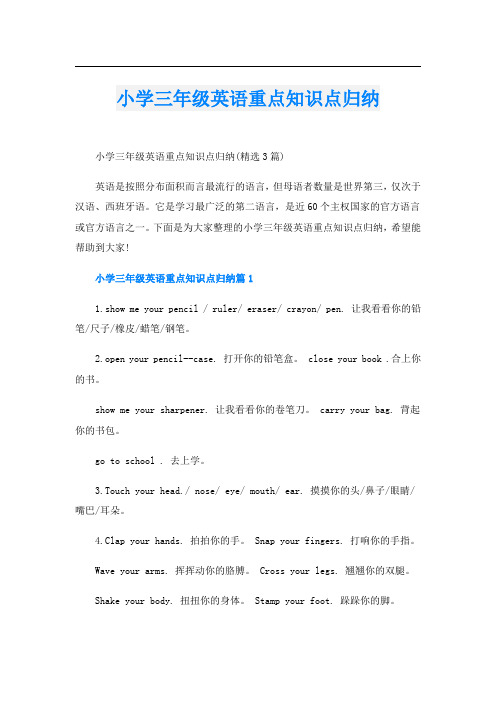
小学三年级英语重点知识点归纳小学三年级英语重点知识点归纳(精选3篇)英语是按照分布面积而言最流行的语言,但母语者数量是世界第三,仅次于汉语、西班牙语。
它是学习最广泛的第二语言,是近60个主权国家的官方语言或官方语言之一。
下面是为大家整理的小学三年级英语重点知识点归纳,希望能帮助到大家!小学三年级英语重点知识点归纳篇11.show me your pencil / ruler/ eraser/ crayon/ pen. 让我看看你的铅笔/尺子/橡皮/蜡笔/钢笔。
2.open your pencil--case. 打开你的铅笔盒。
close your book .合上你的书。
show me your sharpener. 让我看看你的卷笔刀。
carry your bag. 背起你的书包。
go to school . 去上学。
3.Touch your head./ nose/ eye/ mouth/ ear. 摸摸你的头/鼻子/眼睛/嘴巴/耳朵。
4.Clap your hands. 拍拍你的手。
Snap your fingers. 打响你的手指。
Wave your arms. 挥挥动你的胳膊。
Cross your legs. 翘翘你的双腿。
Shake your body. 扭扭你的身体。
Stamp your foot. 跺跺你的脚。
5.Show me your red/ blue / green / yellow / purple crayon.给我看看你的红/蓝/绿/黄/紫色蜡笔。
6.Black, black. Stand up. 黑色,黑色,站起来(起立)!Pink , pink. Sit down. 粉红色,粉红色,坐下!Brown, brown. Touch the ground. 棕色,棕色,摸摸地板。
Orange, orange. Touch your head. 橙色,橙色,摸摸你的头。
小学三年级英语语法知识点总结
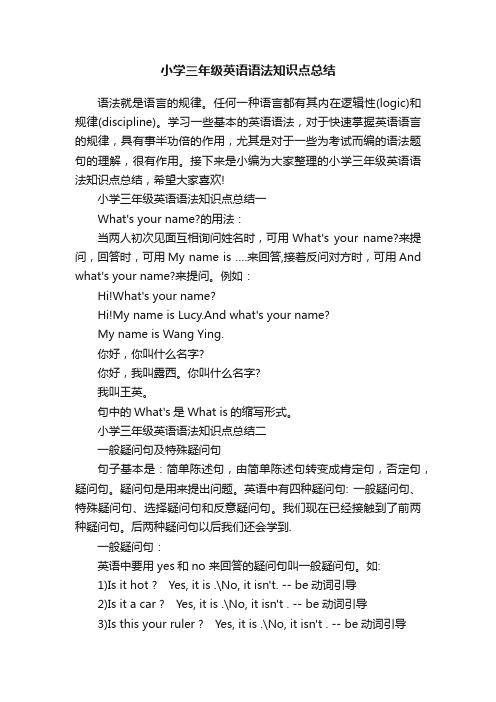
小学三年级英语语法知识点总结语法就是语言的规律。
任何一种语言都有其内在逻辑性(logic)和规律(discipline)。
学习一些基本的英语语法,对于快速掌握英语语言的规律,具有事半功倍的作用,尤其是对于一些为考试而编的语法题句的理解,很有作用。
接下来是小编为大家整理的小学三年级英语语法知识点总结,希望大家喜欢!小学三年级英语语法知识点总结一What's your name?的用法:当两人初次见面互相询问姓名时,可用What's your name?来提问,回答时,可用My name is ….来回答,接着反问对方时,可用And what's your name?来提问。
例如:Hi!What's your name?Hi!My name is Lucy.And what's your name?My name is Wang Ying.你好,你叫什么名字?你好,我叫露西。
你叫什么名字?我叫王英。
句中的What's是What is的缩写形式。
小学三年级英语语法知识点总结二一般疑问句及特殊疑问句句子基本是:简单陈述句,由简单陈述句转变成肯定句,否定句,疑问句。
疑问句是用来提出问题。
英语中有四种疑问句: 一般疑问句、特殊疑问句、选择疑问句和反意疑问句。
我们现在已经接触到了前两种疑问句。
后两种疑问句以后我们还会学到.一般疑问句:英语中要用 yes和no 来回答的疑问句叫一般疑问句。
如:1)Is it hot ? Yes, it is .\No, it isn't. -- be动词引导2)Is it a car ? Yes, it is .\No, it isn't . -- be动词引导3)Is this your ruler ? Yes, it is .\No, it isn't . -- be动词引导4)Do you like bananas ? -- 含实义动词Yes, I like bananas. \ No, I don't like bananas.5)Can Ming hear a drill ? --含情态动词Yes , Ming can hear a drill.\No,Ming can't hear a drill.陈述句(肯定句,否定句,一般疑问句)的转变规律:1.肯定句:2.否定句:3. 一般疑问句及肯否定回答1) 主语+be动词+…. 1) 主语+be动词+not+…. 1)be动词+主语+…?Yes, 主语+be动词./No, 主语+be动词+not.I am a teacher. I am not a teacher. Are you a teacher?--Yes, I am./ No, I am not.My mother is thin. My mother is not /isn't thin. Is your mother thin?--Yes, she is./ No, she isn't.They are insects. They are not/aren't insects. Are they insects?--Yes. they are./ No, they aren't.2) 主语+情态动词can+… 2) 主语+情态动词can+ not+…. 2)情态动词can+主语+…?Yes, 主语+情态动词can/No,主语+情态动词can+ notHe can jump. He can not/can't jump. Can he jump?--Yes,he can./ No, he can't.3) 主语+动词+…. 3) 主语+助动词do/does+not 3) 助动词do/does+主语+…. 动词原形+….动词原形?Yes, 主语+助动词do/does.No, 主语+助动词do/does+not.He likes to eat apples. He doesn't like to eat apples. Does he like to eat apples?Yes,he does./ No,he doesn't.We like to eat apples. We don't like to eat apples. Do you like to eat apples?Yes,we do. /No,we don't.二. 祈使句:表示请求、命令、建议或劝告等的句子叫祈使句,主语you常省略。
小学三至六年级英语知识点归纳总结
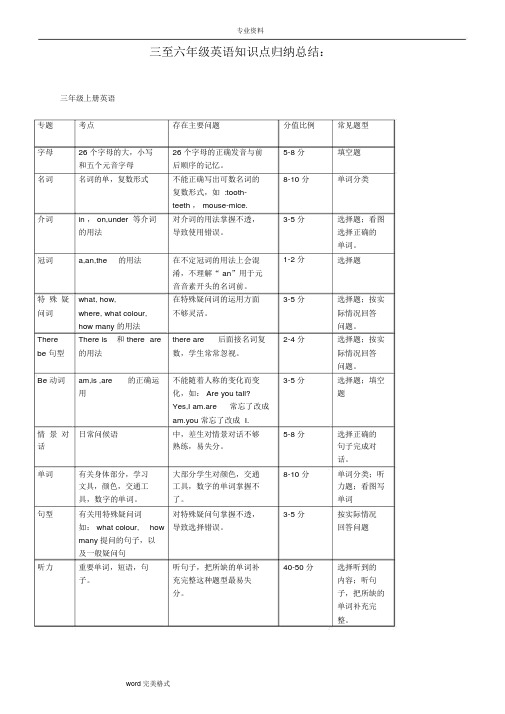
专业资料三至六年级英语知识点归纳总结:三年级上册英语专题考点存在主要问题分值比例常见题型字母26 个字母的大,小写26 个字母的正确发音与前5-8 分填空题和五个元音字母后顺序的记忆。
名词名词的单,复数形式不能正确写出可数名词的8-10 分单词分类复数形式,如 :tooth-teeth , mouse-mice.介词in , on,under 等介词对介词的用法掌握不透,3-5 分选择题;看图的用法导致使用错误。
选择正确的单词。
冠词a,an,the的用法在不定冠词的用法上会混1-2 分选择题淆,不理解“ an”用于元音音素开头的名词前。
特殊疑what, how,在特殊疑问词的运用方面3-5 分选择题;按实问词where, what colour,不够灵活。
际情况回答how many 的用法问题。
There There is和 there are there are后面接名词复2-4 分选择题;按实be 句型的用法数,学生常常忽视。
际情况回答问题。
Be 动词am,is ,are的正确运不能随着人称的变化而变3-5 分选择题;填空用化,如: Are you tall?题Yes,I am.are常忘了改成am.you 常忘了改成 I.情景对日常问候语中,差生对情景对话不够5-8 分选择正确的话熟练,易失分。
句子完成对话。
单词有关身体部分,学习大部分学生对颜色,交通8-10 分单词分类;听文具,颜色,交通工工具,数字的单词掌握不力题;看图写具,数字的单词。
了。
单词句型有关用特殊疑问词对特殊疑问句掌握不透,3-5 分按实际情况如: what colour,how导致选择错误。
回答问题many 提问的句子,以及一般疑问句听力重要单词,短语,句听句子,把所缺的单词补40-50 分选择听到的子。
充完整这种题型最易失内容;听句分。
子,把所缺的单词补充完整。
三年级下册英语有关家husband,wife,broth不理解家谱的关系,不能2-3 分选择题;填空庭成员er,sister,uncle,au写出正确的称呼。
人教版小学3-6年级英语单词表

三年级上册词汇人教版小学英语三年级上册单词表(三会)Unit 1pen:[pen] 钢笔pencil:['pensl] 铅笔pencil-case:['penslkeis] 铅笔盒ruler:['ru:lə] 尺子eraser:[i'reisə] 橡皮crayon:['kreiən] 蜡笔book:[buk] 书bag:[bæg] 书包sharpener:['ʃɑ:pənə] 卷笔刀school :[sku:l]学校Unit 2head:[hed] 头face[feis] 脸nose:[nəuz] 鼻子mouth:[mauθ] 嘴eye:[ai] 眼睛ear:[iə] 耳朵arm:[ɑ:m] 胳膊finger['fiŋgə] 手指leg:[leg]腿foot:[fut] 脚body:['bɔdi] 身体Unit 3red:[red] 红色的yellow:['jeləu] 黄色的green:[gri:n] 绿色的blue:[blu:] 蓝色purple:['pə:pl] 紫色的white:[hwait] 白色的black:[blæk] 黑色的orange:['ɔ:rindʒ] 橙色的pink:[piŋk] 粉色的brown:[braun] 棕色的Unit 4cat:[kæt] 猫dog:[dɔg] 狗monkey:['mʌŋki] 猴子panda:['pændə] 熊猫rabbit:['ræbit] 兔子duck:[dʌk] 鸭子pig:[pig] 猪bird[bə:d] 鸟bear:[bɛə] 熊elephant:['elifənt] 大象mouse:[maus] 老鼠squirrel:['skwirəl] 松鼠Unit 5cake:[keik] 蛋糕bread:[bred] 面包hot dog:[hɔt][dɔg] 热狗hamburger :['hæmbə:gə]汉堡包chicken:['tʃikin] 鸡肉French fries 榨薯条Coke 可乐juice:[dʒu:s] 果汁milk:[milk] 牛奶water:['wɔ:tə] 水tea:[ti:] 茶coffee:['kɔfi] 咖啡Unit 6one:[wʌn] 一two:[tu:] 二three:[θri:] 三four:[fɔ:] 四five:[faiv] 五six:[siks] 六seven:['sevn] 七eight:[eit] 八nine:[nain] 九ten :[ten]十doll:[dɔl] 玩具娃boat:[bəut] 小船ball:[bɔ:l] 球kite:[kait] 风筝balloon:[bə'lu:n] 气球car :[kɑ:]小汽plane:[plein] 飞机三年级下册词汇Unit 1boy:[bɔi] 男孩girl:[gə:l] 女孩teacher:['ti:tʃə] 教师student:['stju:dənt] 学生this:[ðis] 这个my:[mai] 我的friend:[frend] 朋友I’m=I am 我是nice:[nais] 好的愉快的good morning :[gud]['mɔ:niŋ]早上好good afternoon::[gud]['ɑ:ftə'nu:n] 下午好meet:[mi:t]遇见;碰见goodbye:[,gud'bai] 再见too :[tu:]也;太Unit 2father:['fɑ:ðə]爸爸dad:[dæd] 爸爸口语mother:['mʌðə] 母亲;妈妈mom:[mɔm] 妈妈口语man:[mæn] 男人woman:['wumən] 女人grandmother['grænd,mʌðə] 外祖母grandma:['grændmɑ:] (口语)(外)祖母grandfather:['grænd,fɑ:ðə](外)祖父grandpa:['grændpɑ:] (口语)(外)祖父sister:['sistə] 姐妹brother:['brʌðə] 兄妹let’s=let us 让我们great:[greit] 太好了really:['riəli] 真地;确切地and:[ænd] 和并且Unit 3eleven:[i'levn] 十一twelve:[twelv] 十二thirteen:['θə:ti:n] 十三fourteen:['fɔ:'ti:n] 十四fifteen:['fif'ti:n] 十五sixteen:['siks'ti:n] 十六seventeen:[,sevn'ti:n] 十七eighteen:['ei'ti:n] 十八nineteen:['nain'ti:n] 十九twenty:['twenti] 二十how many :[hau]:['meni]多少can:[kæn] 能够;可以look at:[luk][æt] 看;瞧Unit 4peach:[pi:tʃ] 桃pear:[pɛə] 梨orange:['ɔ:rindʒ] 橙子watermelon:['wɔ:tə,melən] 西瓜apple:['æpl] 苹果banana:[bə'nɑ:nə] 香蕉strawberry:['strɔ:bəri] 草莓grape:[greip] 葡萄like:[laik] 喜欢some:[sʌm] 一些;某些thanks 多谢Unit 5bus:[bʌs] 公共汽车bike:[baik] 自行taxi:['tæksi] 出租车jeep:[dʒi:p] 吉普车desk:[desk] 课桌chair:[tʃɛə] 椅子Walkman 随身lamp:[læmp] 台灯your:[juə] 你的;你们的zoo:[zu:] 动物园Unit 6small:[smɔ:l] 小的big:[big] 大的long:[lɔŋ] 长的short:[ʃɔ:t] 短的;矮的tall:[tɔ:l] 高的giraffe:[dʒi'rɑ:f] 长颈鹿deer:[diə] 鹿人教版四年级英语上册Unit 1 教室物品classroom 教室.window 窗户blackboard 黑板.light 电灯.picture 图画door门teacher’s desk讲台computer 计算机fan 风扇wall墙壁floor地板really (表示兴趣或惊讶)真的near 距离近TV电视clean 打扫help 帮助Unit 2 文具schoolbag 书包maths book 数学书English book英语书Chinese book 语文书storybook 故事书candy 糖果notebook 笔记本toy 玩具key 钥匙wow 哇;呀Lost 丢失(lose的过去式形式)So much 非常地Cute 可爱的Unit 3 描述人物strong 强壮的friendly 友好的quiet 安静的hair 头发shoe 鞋glasses 眼镜his 他的or 或者right 正确的;对的hat常指带檐的)帽子her 她的Unit 4 房间及其陈设bedroom 卧室living room 客厅;起居室study 书房kitchen厨房bathroom 浴室;洗手间bed床phone 电话table 桌子sofa长沙发fridge 冰箱find 找到them他(她、它)们Unit 5 食物和餐具beef 牛肉chicken鸡肉noodles 面条soup 汤vegetable蔬菜chopsticks 筷子bowl 碗fork 餐叉knife 刀spoon勺dinner中午或晚上吃的)正餐ready 准备好help yourself 为(自己)取用pass 给;try 试;尝试Unit 6 家庭成员和职业parents 父母cousin 同辈表亲(或堂亲)uncle 舅父;叔父;伯父;姑父;姨夫aunt 姑母;姨母baby brother 婴儿小弟弟doctor 医生cook 厨师driver司机farmer 农民nurse 护士people 人们but 但是little 小的puppy 小狗football player 足球运动员job工作basketball 篮球四年级下册词汇Unit 1computer:[kəm'pju:tə] 计算机 board:[bɔ:d] 写字板 fan:[fæn] 风扇 light:[lait] 灯 this:[ðis] 这;这个 is:[iz] 是 my:[mai] 我的 that:[ðæt] 那;那个 your:[juə] 你的teacher’s desk 讲台 picture:['piktʃə] 图画;照片 wall 墙壁 floor:[flɔ:] 地板 yes:[jes] 是;是的 it :[it]它Unit 2 class:[klɑ:s]课程one一two二three三four 四five五six 六 seven 七 eight 八 nine 九ten 十 what 什么 time 时间it’s=it is o’clock…点钟 math 数学Chinese 语文 English 英语 P.E. 体育 music 音乐 for 为;给Unit 3jacket :['dʒækit]夹克衫 shirt:[ʃə:t] 衬衫 skirt:[skə:t] 裙子 dress:[dres] 连衣裙 T-shirt T恤衫 red:[red] 红色的 blue:[blu:] 蓝色的 yellow:['jeləu] 黄色的 green:[gri:n] 绿色的 white:[hwait] 白色的 no:[nəu] 不;不是 not:[nɔt] 不;不是的 colour:['kʌlə] 颜色Unit 4warm:[wɔ:m] 暖和的 cold:[kəuld] 寒冷的 cool:[ku:l] 凉爽的 today:[tə'dei] 今天 jeans:[dʒi:nz] 牛仔裤 pants:[pænts] 长裤 socks 袜子 shoes 鞋子let’s=let us play 玩;踢 football:['futbɔ:l] 足球 snowy:[snəui] 下雪的 sunny:['sʌni] 晴朗的Unit 5how much 多少钱 big:[big] 大的 small:[smɔ:l] 小的 long:[lɔŋ]长的 short :[ʃɔ:t]短的 apple:['æpl] 苹果 banana:[bə'nɑ:nə]香蕉 pear:[pɛə] 梨 orange:['ɔ:rindʒ] 橙子 watermelon:['wɔ:tə,melən] 西瓜 are:[ɑ:]是 they:[ðei] 它他,她们Unit 6horse:[hɔ:s] 马aren’t=are not cat 猫 rabbit:['ræbit] 兔子 pig:[pig] 猪 duck:[dʌk] 鸭子 dog:[dɔg] 狗 eleven:[i'levn] 十一 twelve:[twelv] 十二 thirteen:['θə:ti:n] 十三 fifteen:['fif'ti:n] 十五 twenty:['twenti] 二十 how many:[hau]['meni] 多少 there:[ðɛə] 那儿;那里五年级上册单词Unit1old老的;年纪大的 young年轻的,岁数还大的 funny滑稽的;可笑的 kind体贴的;慈祥的;宽容的strict要求严格的;严厉的 polite有礼貌的;客气的 hard-working工作努力的;辛勤的helpful有用的;愿意帮忙的 clever聪明的;聪颖的 shy羞怯的;腼腆的;怕且生的know知道;了解 our我们的 Ms(用于女子的姓氏或姓名前,不指明婚否)女士 robot机器人 speak 说、讲 finish完成;做好Unit2Monday星期一 Tuesday星期二 Wednesday星期三 Thursday星期四 Friday星期五 Saturday星期六 Sunday 星期日 weekend周末 wash洗 wash my clothes洗我的衣服 watch 看 watch TV看电视 do做;干 do homework做作业 read看;读 read books看书 play踢;玩;参加(体育运动) play football踢足球 cooking 烹饪;烹调often时常;常常 park公园 sport 体育运动 play sports做体育运动 every每一个,每个 day一天;一日Unit3sandwich三明治 salad蔬菜沙拉;混合沙拉 hamburger汉堡包 ice cream冰激凌 tea茶;茶水 fresh新鲜的;刚摘的 healthy健康的 delicious美味的;可口的 hot辣的;辛辣的 sweet含糖的;甜的 drink喝;饮thirsty渴的;口渴的 favourite特别喜爱的 food食物 Dear (用于信函抬头的名字或头衔前)亲爱的 Onion 洋葱;葱头Unit4sing唱;唱歌 song歌曲 sing English songs唱英语歌play the pipa弹琵琶 kung fu功夫;武术 do kung fu 练功夫 dance跳舞 draw画 cartoon漫画 draw cartoons画漫画 cook烹调;烹饪 swim游泳 play basketball 打篮球 ping-pong乒乓球 play ping-pong打乒乓球 speak English 说英语 party聚会;派对next 下一人的;紧接着的;接下来的 wonderful极好的;了不起的Unit5clock时钟;钟 plant植物 bottle瓶子 water bottle水瓶 bike自行车;脚踏车载斗量 photo照片;相片 front 正面 in front of 在前面 between 在中间 above在(或向)上面 beside在旁边(附近) behind在(或向)后面 there is/there are(表示有) grandparent祖父;祖母;外祖父;外祖母 lot大量;许多lots of+复数大量...;许多... dirty肮脏的 mouse老鼠 nature大自然Unit6forest森林;林区 river河;江 lake湖;湖泊 mountain高山;山岳 hill山丘;小山 tree树;树木;乔木 bridge 桥 building建筑物;房子 village村庄;村镇 house房屋;房子;住宅 boating划船 go boating去划船isn’t=is not aten’t=are not robbit兔子;野兔 high高的PEP六年级上册四会单词词汇表Unit 1by (经,乘) foot(脚) bike(自行车) bus(公共汽车) train(火车) how(怎样) go to school(上学)traffic(交通)traffic light(交通灯)traffic rule(交通规则)stop(停,停车站)wait(等待)get to(到达)Unit 2library(图书馆) post office(邮局) hospital(医院) cinema(电影院) turn(转弯) bookstore(书店) where(在哪里,到哪里) please(请) next to(与…相邻) right (右边) left(左边) straight(成直线地) then (然后)Unit 3next week(下周) this morning(今天上午) this afternoon(今天下午)this evening (今天晚上) comic book(漫画书) post card(明信片) newspaper(报纸) buy(购买)Unit 4hobby(爱好) ride a bike--riding a bike(骑自行车) dive--diving(跳水)play the violin—playing the violin(拉小提琴)make kites—making kites(制作风筝)collect stamps—collecting stamps(集邮) live –lives(居住) teach--teaches(教) go--goes(去) watch--watches(看) read--reads(读,看) does doesn’t=does notUnit 5singer(歌唱家,歌手) writer(作家) actor(男演员) actress(女演员) artist(画家) TV reporter(电视台记者) engineer(工程师) accountant(会计) policeman(男警察) salesperson(销售员)cleaner(清洁工) where(在哪里,到哪里)work(工作)Unit 6rain(雨) cloud (云) sun(太阳) stream(河,溪) come from(来自,从…来) seed(种子) soil(土壤) sprout (苗,芽) plant(植物,种植) should (应该) then(然后)PEP六年级下册四会单词词汇表Unit 1tall—taller更高的short—shorter 更矮的strong—stronger 更强壮的old—older 年龄更大的young—younger 更年轻的big—bigger 更大的heavy—heavier 更重的long—longer 更长的thin—thinner 更瘦的small—smaller (体型)更小的Unit 2have a fever 发烧have a sore throat喉咙疼have a cold感冒have a toothache 牙疼have a headache 头疼matter事情,麻烦sore 疼的hurt疼痛nose 鼻子tired疲劳的,累的excited兴奋的angry生气的happy高兴的bored无聊的,烦人的sad 忧伤的,悲伤的Unit 3watch—watched 看wash—washed 洗clean—cleaned打扫play—played玩visit—visited 看望do—didlast weekend 上一个周末go—went去go to a park—went to a park 去公园go swimming—went swimming去游泳go fishing—went fishing去钓鱼read—read 读go hiking—went hiking 去远足Unit 4learn Chinese—learned Chinese学汉语sing and dance—sang and danced 唱歌和跳舞eat good food—ate good food吃好吃的食物take pictures—took pictures 照相climb—climbed 爬have—had buy presents—bought presents买礼物row a boat—rowed a boat 划船see elephant—saw elephant 看大象go skiing—went skiing 去滑雪go ice-skating—went ice-skating 去滑冰how怎么,如何get—got 到达last 上一个的,仅余的,留在最后的。
三至六年级英语必背知识点

一、基础语法1.一般现在时:表示经常性的、习惯性的或真理性的动作或状态。
2.一般过去时:表示过去一些时间发生的动作或存在的状态。
3. 表达过去习惯的方式:used to + 动词原形。
4.现在进行时:表示现在正在进行的动作,常与现在时间状语连用。
5. 情态动词can/could:表示能力、许可或请求。
6. 情态动词should/shouldn't:表示建议或劝告。
7.数词的表达方式:基数词和序数词的用法。
8.比较级和最高级的形式及用法:形容词和副词的比较级和最高级的构成和用法。
9. 定冠词和不定冠词的用法:the、a/an的用法。
10.名词单复数的形式及用法:不规则名词的复数形式。
二、日常用语1. 问候和道别的常用表达:例如Hello, Hi, Good morning, Goodbye, Bye等。
2. 自我介绍和介绍他人的常用表达:例如My name is…, I am…, This is…等。
3. 家庭和亲属的称呼:例如father, mother, sister, brother, grandparents等。
4. 日常生活中常用的动词和词组:例如eat, drink, sleep, get up, go to school, do homework等。
5. 表述喜欢和不喜欢的表达方式:例如I like…, I don't like…,I love…等。
6. 询问和表达年龄的句型:例如How old are you?, I am… years old等。
7. 询问和表达兴趣爱好的句型:例如What do you like to do?, I like…等。
9. 表述天气的常用句型:例如What's the weather like today?,It's sunny, rainy, cloudy等。
10. 询问和表达方向的句型:例如Excuse me, How can I get to…?, Go straight, Turn left/right等。
小学六年级英语语法知识点汇总

小学六年级英语语法知识点汇总语法的学习,需要付出大量的时间和精力。
马上要到毕业考试了,为了帮助大家掌握小学英语的基础知识点.接下来是小编为大家整理的小学六年级英语语法知识点汇总,希望大家喜欢!小学六年级英语语法知识点汇总一一、重点短语:this morning 今天上午this afternoon 今天下午this evening 今天晚上next week 下周tomorrow 明天 tonight 今晚post card 明信片 comic book漫画书newspaper报纸二、重点句型:1.What are you going to do on the weekend?你周末打算做什么?2.I’m going to visit my grandparents this weekend?这个周末我打算去看望我的外祖父母。
3.Where are you going this afternoon? 你今天下午打算去哪里?4.I’m going to the bookstore.我打算去书店。
5.What are you going to buy?你打算去买什么?6.I’m going to buy a comic book.我打算去买一本漫画书。
三、重点语法:1、What are you going to do?你想做什么?询问他人在未来的打算。
be going to 后面要跟动词的原形。
注意be going to be 意思是"打算成为什么,干什么职业。
"注意一下句子的区别,找出正确回答。
What are you going to do this afternoon?What are you going to buy?What are you going to be?When? are you going?Where are you going?How are you going?Who are you going with?2、this evening 和tonight的区别:this evening指的是今天晚上睡觉以前的时间,一般指晚上十二点以前。
人教版小学英语_3-6年级完整版带音标

人教版小学英语3--6 年级单词938 个人教版小学英语三年级上册Unit 11. Pen [pen] 钢笔2. pencil ['pensəl] 铅笔3. pencil-case ['pensəlkeis] 铅笔盒4. ruler ['ru:lə] 尺子5. eraser [i'reizə] 橡皮6. crayon ['kreiən] 蜡笔7. book [buk] 书8. bag [bæɡ] 书包9. sharpener['ʃɑ:pənə] 卷笔刀10. school [sku:l] 学校Unit 4Unit 211. head[hed]头32. cat [kæt] 猫33. dog [dɔɡ, dɔ:ɡ] 狗34. monkey ['mʌŋki] 猴子35. panda ['pændə] 熊猫36. rabbit ['ræbit] 兔子37. duck dʌk] 鸭子38. pig [piɡ] 猪39. bird [bə:d] 鸟40. bear [bεə] 熊41. elephant ['elifənt] 大象42. mouse ]maus, mauz] 老鼠43. squirrel ['skwə:rəl] 松鼠Unit 322. red [red] 红色的23. yellow ['jeləu] 黄色的24. green [ɡri:n] 绿色的25. blue [blu:] 蓝色的26. purple ['pə:pl] 紫色的27. white [wait] 白色的28. black [blæk] 黑色的29. orange ['ɔrindʒ] 橙色的30. pink [piŋk] 粉色的31. brown [braun] 棕色的12. face [feis] 脸13. nose [nəuz] 鼻子14. mouth [mauθ] 嘴15. eye [ai] 眼睛16. ear [iə] 耳朵17. arm [ɑ:m] 胳膊18. finger ['fiŋɡə] 手指19. leg [leɡ] 腿20. foot [fut] 脚21. body ['bɔdi] 身体Unit 544. cake [keik] 蛋糕45. bread [bred] 面包47. hot dog 热狗48. hamburger ['hæmbə:ɡə] 汉堡包49.chicken ['tʃikin] 鸡肉50. French [frentʃ] Fries 炸薯条51. Coke [kəuk] 可乐52. juice [dʒu:s] 果汁53. milk [milk] 牛奶54. water ['wɔ:tə] 水55. tea [ti:] 茶56. coffee ['kɔfi] 咖啡68. boat [bəut] 小船69. ball [bɔ:l] 球70. kite [kait] 风筝71. balloon [bə'lu:n] 气球72. car [kɑ:] 小汽车73. plane [plein] 飞机人教版小学英语三年级下册Unit 174. boy [bɔi] 男孩75. girl [ɡə:l] 女孩76. teacher ['ti:tʃə] 教师77. student ['stju:dənt] 学生Unit 657. one [wʌn] 一58. two [tu:] 二59. three[θri:] 三60. four [fɔ:] 四61. five [faiv] 五62. six [siks] 六63. seven ['sevən] 七64. eight [eit] 八65. nine [nain] 九66. ten [ten] 十67. doll [dɔl] 玩具娃娃78. this [ðis, 弱ðəs] 这个79. my我的80. friend [frend] 朋友81. I’m=I am我是82. nice [nais] 好的;愉快的83. good morning ['mɔ:niŋ] 早上好84. good afternoon [,ɑ:ftə:'nu:n]"下午好85. meet [mi:t] 遇见;碰见86. goodbye [,ɡud'bai] 再见87. too [tu:] 也;太Unit 288. father ['f ɑ:ðə] 父亲;爸爸 89. dad 爸爸 口语90. mother ['m ʌðə] 母亲;妈妈 91. mom 妈妈 口语 92. man [mæn] 男人 93. woman ['wum ən] 女人94. grandmother ['ɡrænd,m ʌðə] 外祖母 95. grandma ['ɡrændm ɑ:](口语(外祖母111. seventeen [,sev ən'ti:n] 十七 112. eighteen ['ei'ti:n] 十八 113. nineteen [,nain'ti:n] 十九 114. twenty ['twenti] 二十 115. how [hau] many ['meni]多少 116. can [kæn, k ən] 能够;可以 117. look [luk] at [强æt, 弱ət]看;瞧Unit 496. grandfather ['ɡrænd,f ɑ:ðə](外)祖父 118. peach [pi:t ʃ] 桃 97. grandpa ['ɡrændp ɑ:](口语(外)祖父 119. pear [pεə] 梨 98. sister ['sist ə]姐妹120. orange ['ɔrind ʒ] 橙子121. watermelon ['w ɔ:t əmel ən] 西瓜 122. apple ['æpl] 苹果 123. banana [b ə'n ɑ:n ə] 香蕉 124. strawberry ['str ɔ:b əri] 草莓 125. grape [ɡreip] 葡萄 126. like [laik] 喜欢 127. some [s ʌm] 一些;某些Unit 3105. eleven [i'lev ən] 十一 106. twelve [twelv]十二Unit 5129. bus [b ʌs] 公共汽车 130. bike [baik] 自行车 131. taxi ['tæksi] 出租车 132. jeep [d ʒi:p] 吉普车99. brother ['br ʌðə] 兄妹 100. let’s=let [let] us [ʌs] 让我们 101. great [ɡreit] 太好了102. really ['ri əli, 'ri:li] 真地;确切地 103. and [ænd] 和;并且 104. how [hau] 多么;怎么样128. thanks 多谢107. thirteen 'θə:'ti:n] 十三 108. fourteen ['f ɔ:'ti:n] 十四 109. fifteen ['fifti:n] 十五 110. sixteen ['siks'ti:n] 十六133. desk [desk] 课桌 134. chair [t ʃεə] 椅子 135. Walkman 随身听 136. lamp [læmp] 台灯137. your [j ɔ:, j əu, 弱 j ə] 你的;你们的 138. zoo [zu:] 动物园153. many ['meni] 154. our ['au ə]许多的 我们的.同学 155. classmate ['kl ɑ:smeit] 156. have a look [luk] 157. seat [si:t] 158. near [ni ə]座位. 在…的旁边看一看159. new [nju:] 新的Unit 6139. small [sm ɔ:l] 小的 140. big [bi ɡ] 大的 141. long [l ɔŋ, l ɔ:ŋ] 长的 142. short [ʃɔ:t] 短的;矮的 143. tall [t ɔ:l] 高的144. giraffe [d ʒi'r ɑ:f] 长颈鹿 145. deer [di ə] 鹿Unit2166. good idea [ɡud] [ ai'di ə]人教版小学英语四年级上册167. all right [ɔ:l] [rait] 168. good job [j ɔb]Unit1146. window ['wind əu] 147. board [b ɔ:d] 148. light ['lait] 窗户好主意 160. where [wεə]在哪里计算机 讲台161. computer [k əm'pju:t ə] 162. teacher’s desk [desk] 163. wall [w ɔ:l] 164. fan [fæn]墙 扇子;电扇165. clean [kli:n] 打扫;清洁;擦干净的好吧;好的干得好语文书169. Chinese book [buk]170. English book 英语书 171. math book [mæθ]写字板 灯;管灯画;图画数学书172. schoolbag ['sku:lbæɡ] 书包 173. story-book['st ɔ:ri] 故事书 174. notebook ['n əutbuk] 175. colour ['k ʌl ə] 教室149. picture ['pikt ʃə] 150. door [d ɔ:] 151. floor [fl ɔ:]门. 地板.笔记本颜色152. classroom ['kl ɑ:srum]176. fat [fæt]胖的177. may [mei] 178. sure [ʃu ə] 可以 当然可以. [hi ə]给你 二十一200. painting ['peintiŋ]绘画201. computer game [k əm'pju:t ə] [ɡeim]电脑游戏她的对的;正确的179. here you are180. twenty ['twenti]-one 181. thirty ['θə:ti] 182. thirty-one 183. forty ['f ɔ:ti] 184. forty-one三十. 202. Her [ h ə: ] 203. right [rait]三十一 四十 Unit4204. study ['st ʌdi] 书房 . 205. bathroom ['b ɑ:θrum] 206. bedroom ['bedrum]207. living ['liviŋ] room 208. kitchen ['kit ʃin] 209. fish [fi ʃ]鱼.房间 打开 关上. 电话 沙发卫生间 卧室 起居室 四十一185. fifty[ 'fifti ]五十 186. too many 太多了 187. heavy ['hevi] 188. sorry ['s ɔ:ri]重的;沉重的. 对不起 .厨房Unit3189. long hair [ l ʌŋ] [ hεə ] 长头发. 190. short hair [ʃɔ:t ] 191. thin [θin] 瘦的强壮的 安静的 . 朋友. 短头发210. room [ru:m] 211. open ['əup ən] 212. close [kl əuz] 213. phone [f əun] 214. sofa ['s əuf ə] 192. strong [str ɔŋ] 193. quiet ['kwai ət] 194. friend [frend]215. shelf [ʃelf ] 书架 216. fridge [frid ʒ]冰箱195. Chinese [trai'ni:z] n.中文,汉语;中国人 adj. 中国的,中国人的; 196. Photo ['f əut əu] 197. music ['mju:zik] 198. science ['sai əns] 199. sports [sp ɔ:ts]照片. 音乐 科学 体育运动.Unit5米饭面条(复数)217. rice [rais]218. noodle(s) ['nu:dl] 219. soup [su:p]汤 220. vegetable ['ved ʒit əbl]蔬菜.221. beef [bi:f] 牛肉晚餐;正餐. 245. only ['əunli] 246. puppy ['p ʌpi]只有;仅仅 小狗222. dinner ['din ə] 223. wait [weit]等.饥饿的 247. baseball player ['beisb ɔ:l] ['plei ə ]棒球运动员 248. driver [draiv ə] 筷子249. doctor [d ɔkt ə] 250. farm [f ɑ:m] 司机. 医生 农场农民 224. hungry ['h ʌŋɡri] 225. knife [naif]刀226. chopstick(s) ['t ʃɔpstik] 227. spoon [spu:n] 228. plate [pleit] 229. plane [plein] 230. fork [f ɔ:k] 231. pass [p ɑ:s] 232. ready ['redi] 233. try [trai]勺子 盘子 飞机 251. farmer ['f ɑ:m ə] 252. nurse [n ə:s]护士叉子 传递 准备好了. Unit1操场人教版小学英语四年级下册尝试234. help yourself [help] [j ɔ:'self]随便吃 253. playground ['plei ɡraund] 235. show [ʃəu] 展示好吃的.254. garden ['ɡɑ:dn ]花园236. yummy[ 'j ʌmi] 237. use [ju:z]使用 255. teacher,s-office ['ɔfis] 教师办公室 256. library ['laibr əri] 257. canteen [kæn'ti:n]图书馆 . 食堂Unit 6家庭 父母258. first [f ə:st] 第一 .客人;参观者 238. family ['fæmili] 259. visitor ['vizit ə] 260. there [ðεə] 261. lunch [l ʌnt ʃ] 262. this way [wei] 263. that [ðæt]239. parents ['pεər ənts] 240. uncle['ʌŋkl] 241. aunt [ɑ:nt]哪儿;那里 午餐 这边 叔叔;舅舅. 姨;姑姑;婶; .242. baby ['beibi] 婴儿. . 243. people ['pi:pl]人244. member ['memb ə] 成员 .那;那个 .绘画教室 264. art room [ɑ:t] [ru:m] 265. computer room计算机教室266. washroom ['w ɔʃrum] 267. music room ['mju:zik] 268. gym [d ʒim]体育馆 .卫生间 音乐教室 .中国人 adj. 中国的,中国人的; 中国话的 290. china['t ʃain ə]n. 中国;瓷器 n.英格兰;英国 269. TV room 电视机房 270. second ['sek ənd] 第二 271. cool [ku:] 订好的;酷的.291. England ['iŋglənd] 292. English ['iŋgli ʃ]a.英国的;英国人的;英语的 n.英语;英国人 293. P.E. 体育Unit2272. English class 英语课 273. music class [kl ɑ:s] 音乐课 274. breakfast ['brekf əst] 早餐. . 275. P.E. class 体育课 276. over ['əuv ə]结束294. class [kl ɑ:s] 班级;课程音乐.295. music ['mju:zik] 296. for [f ɔ:]为;给.Unit3297. jacket [ 'd ʒækit] 298. shirt [ʃə:t] 299. T-shirt再多一会 夹克衫 . 277. go to the playground['plei ɡraund]去操场衬衫 . T 恤衫裙子 . 连衣裙.278. just a minute['minit] 279. go home [h əum] 280. kid [kid] 282. run [r ʌn]300. skirt [sk ə:t] 301. dress [dres]回家小孩;孩子 跑.起床上学302. sweater ['swet ə] 毛衣 . 303. whose [hu:z] 304. no [n əu]谁的 283. get up [ɡet][ʌp ] 不;不是284. go to school [sku:l] 285. go to bed 上床睡觉 286. ready['redi]305. not [n ɔt] 不;不是的 306. jeans [d ʒi:nz]307. pants [pænts] 牛仔裤 长裤父母亲准备好的 抓紧;赶快 . 数学287. hurry ['h ʌri] 288. math [mæθ]308. parents ['pεər ənts] 309. socks [s ɔks]袜子 鞋子289. Chinese ['t ʃai'ni:z] n. 中文,汉语 310. shoes [ʃuz]311. shorts [ʃɔ:ts] 312. these [ði:z] 313. those [ðəuz] 314. what for [wɔt]短裤这些.那些.为什么332. windy ['windi]333. cloud [klaud]有风的云多云的334. cloudy ['klaudi]335. sun [sʌn] 太阳.336. sunny ['sʌni]315. neighbour ['neibə] 邻居316. colour ['kʌlə]颜色晴朗的没什么337. not much [mʌtʃ]338. New York 纽约Unit4317. warm [wɔ:m] 318. cold [kəuld] 319. cool [ku:l] 320. hot [hɔt]暖和的寒冷的凉爽的;酷的炎热的.天气.339. matter ['mætə] 事情;麻烦340. have to 必须;不得不Unit5341. colourful ['kʌləful]342. pretty ['priti]色彩丰富的321. weather ['weðə]漂亮的;可爱的322. weather report [ri'pɔ:t]323. wear [wεə] 324. football穿天气预报. 343. cheap [tʃi:p] 便宜的.344. expensive [iks'pensiv]昂贵的. ['futbɔ:l]足球.345. sixty['siksti(:)]六十七十.百325. put on 穿上. put on 动词,表示穿上346. seventy ['sevənti]衣服的动词,强调动作wear 动词,表示穿347. hundred ['hʌndrəd]上衣服的动作,也可表示穿着衣服的状态, 348. how much 多少钱强调状态326. rain [rein]n.雨vi.下雨349. ninety-nine ['nainti]九十九350. sneakers ['sni:kəz]胶底帆布鞋网球鞋351. slippers ['slipə]352. sandals ['sandl]353. boots [bu:ts]354. want [wɔnt]327. rainy ['reini] 下雨的.328. now [nau] 329. snow [snəu]现在n.雪;vi.下雪下雪的.拖鞋凉鞋靴子330. snowy ['snəui]331. wind [wind]n.风想要.355. pair [pεə]一双;一对.379. there [ðεə]be有356. a pair of 一双357. son [sʌn] 儿子358. sun [sʌn] 359. size [saiz] 360. take [teik] 361. them [ðem]太阳尺码买.它(他、她)们人教版小学英语五年级上册Unit 1380. Young [jʌŋ]年轻的381. funny ['fʌni] 滑稽可笑的382. tall [tɔ:l]高的强壮的383. strong [strɔŋ, strɔ:ŋ]Unit 6362. sheep [ʃip] 363. horse [hɔ:s] 364. hen [hen] 365. lamb [læm] 366. goat [ɡəut] 367. cow [kau]绵羊马母鸡小羊;羔羊山羊.奶牛.驴子384. kind [kaind]385. old [əuld]386. short [ʃɔ:t]387. thin [θin]388. Mr389. from先生从;来自和蔼的、亲切的年老的矮的瘦的390. Canada ['kænədə]391. like [laik]392. know [nəu]加拿大368. donkey ['dɔŋki] 369. key [ki:]钥匙.像、喜欢知道校长370. rabbit ['ræbit] 371. pig [piɡ]猪兔子.393. principal ['prinsəpəl]394. university [,ju:ni'və:səti] student 鸭子西红柿黄瓜['stju:dənt, 'stu:-] 大学生395. strict [strikt] 严格的396. smart [smɑ:t] 聪明的、巧妙的397. active['æktiv]398. Miss 小姐399. lady['leidi]400. so much372. duck[ dʌk ]373. tomoto [tə'ma:təu] 374. cucumber ['kju:kʌmbə]375. potato [pə'teitəu] 376. onion ['ɔnjən] 377. carrot ['kærət] 378. fresh [freʃ]土豆积极的、活跃的洋葱.胡萝卜女士;小姐;夫人新鲜的很;非常401. fun[fʌn]有趣;逗笑安静的、文静的421. read[ri:d]books读书402. quiet ['kwaiət]403. very['veri]很、非常但是Unit 3422. cabbage[['kæbidʒ]]菜洋白菜;卷心404. but[强bʌt, 弱bət, bʌt]Unit 2403. Monday ['mʌndi, 'mʌndei]星期一404. Tuesday ['tju:zdi]星期二423. pork[pɔ:k] 猪肉424. mutton['mʌtən] 羊肉423. eggplant'eɡplɑ:nt,-plænt]鱼beans[bi:n]青豆茄子405. Wednesday ['wenzdi; -dei] (星期424. fish[fiʃ]三)406. Thursday ['θə:zdi; -dei] 星期四407. Friday ['fraidi]星期五425. green[ɡri:n]426. tofu豆腐427. potato [pə'teitəu]土豆408. Moral ['mɔrəl, 'mɔ:-] Studies思想品德课409. Social ['səuʃəl] Studies 社会课410. Saturday ['sætədi; -dei] 星期六411. Sunday ['sʌndei; -di] 412. day [dei]天星期天428. tomato[tə'mɑ:təu, -'mei-]西红柿429. for为中餐430. lunch [lʌntʃ]431. we我们432. menu ['menju:, mə'nju:] 菜单433. sound [saund] 听起来434. Mew Mew猫咪健康的好吃的甜的413. wait [weit] 等等;等待414. tomorrow [tə'mɔrəu -'mɔ:-]明天415. often ['ɔfən, 'ɔftən, 'ɔ:-] 经常416. love [lʌv] 417. have 418. on 419. do爱;热爱435. healthy['helθi]436. tasty ['teisti]437. sweet [[swi:t]]438. sour ['sauə]439. fresh [freʃ]有、吃在…..时候homeworkTV 做作业酸的新鲜的咸的最喜欢的440. salty ['sɔ:lti]420. watch看电视441. favourite ['feivərit]442. they are他们是水果葡萄462. do the dishes [diʃ]463. put away [ə'wei]收拾衣服464. have a try试一试洗碗碟the clothes443. fruit [fru:t] 444. grape [ɡreip]445. now [nau] 446. have to 447. eat [i:t]现在不得不吃465. robot['rəubɔt, -bət, 'rɔbət]人466. play [plei]chess[tʃes]机器下棋Unit 4448. empty ['empti] the trash [træʃ]倒垃圾449. cook the meals [mi:ls]烧饭467. use [ju:z] a computer[kəm'pju:tə]使用计算机Unit 5468. air-conditioner ['εəkən,diʃən] 空调450. water the flowers ['flauə]浇花451. sweep [swi:p] the floor [flɔ:] 452. clean [kli:n] thebedroom['bedru(:)m]453. helpful ['helpful]454. at home 455. ill [il]在家里有病的打扫卧室有帮助的扫地469. curtain ['kə:tən]470. trash bin窗帘垃圾箱壁橱镜子471. closet ['klɔzit]472. mirror ['mirə]473. end [end] table ['teibl] (床头柜)474. look at475. own [əun]476. flat [flæt]就这么干吧477. third [θə:d]看一看自己的公寓第三的卧室456. wash [wɔʃ, wɔ:ʃ] the windows ['windəu]擦窗户457. just [dʒʌst] do it458. do housework ['hauswə:k]459. make [meik] the bed 460. set[set]the table铺床摆饭桌做家务478. bedroom ['bedru(:)m]479. kitchen ['kitʃin]厨房480. bathroom ['bɑ:θrum]481. living ['liviŋ] room482. in卫生间客厅461. wash [wɔʃ, wɔ:ʃ] the clothes[kləuðz]洗衣服在…里面483. on在…上面在…下面 507. house [haus, hauz] 508. bridge [brid ʒ] 509. tree [tri:] 510. road [r əud]树公路 桥房子484. under ['ʌnd ə] 485. near [ni ə]在..旁边在…后边 486. behind [bi'haind] 487. over ['əuv ə] 在…上面衣服 511. building ['bildiŋ] 建筑物 512. clean [kli:n] 513. air [εə]空气干净的488. clothes [kl əuðz] 489. work [w ə:k] 490. tell [tel]工作 告诉;说514. run 跑;奔跑 515. any ['eni]任何的;所有的Unit 6491. sky [skai] 天空云Unit 1516. do morning exercises ['eks əsaiz]晨 练草517. eat breakfast 吃早饭上英语课人教版小学英语五年级下册492. cloud [klaud]493. mountain ['mauntin] 山;山脉 494. river ['riv ə] 495. flower ['flau ə] 河流 花496. grass [ɡr ɑ:s, ɡræs] 497. lake [leik] 湖泊森林518. have English class498. forest ['f ɔrist] 519. play sports 进行体育运动 520. eat 521. whendinner吃晚饭499. path [p ɑ:θ, pæθ] 500. park [p ɑ:k] 公园路 什么时候501. nature ['neit ʃə] 502. farm [f ɑ:m] park 自然公园 522. about [ə'baut] 关于;大约 523. policeman [p ə'li:sm ən] 警察农场假期 照片 乡村;村庄503. holiday ['h ɔl ədi] 504. picture ['pikt ʃə] 505. village ['vilid ʒ] 506. city ['siti]城市524. work [w ə:k]工作525. evening 夜晚;晚上 526. get up 527. at起床在……点钟528. usually 通常;一般 529. noon中午550. play with 玩… 雪551. snow [sn əu]530. tell 告诉;说531. climb mountains ['mauntin]爬山 532. go shopping 533. play the弹钢琴534. visit ['vizit] grandparents['ɡrænd,pεər ənt] 看望祖父母去远足552. leaf [li:f] (复数 leaves )叶子 553. up[ʌp]至北方或北方城市['ʃɔpiŋ] 购物;买东西 554. north 北方;向北方piano [pi'æn əu, pi'ɑ:-]555. Halloween [,hæl əu'i:n]万圣节之前 夕556.Thanksgiving['θæŋks,ɡiviŋ; ,θæŋks'ɡ-]感恩节535. go hiking [haiking]557. swim [swim] 游泳放风筝滑冰;滑冰鞋536. weekend [,wi:k'end, 'wi:kend] 周末 558. fly kites 537. often ['ɔf ən, 'ɔft ən, 'ɔ:-] 经常 538. sometimes 539. rain[rein]['s ʌmtaimz] 有时候 下雨也 559. skate [skeit]560. make a snowman ['sn əumæn]堆雪 人561. plant [pl ɑ:nt, plænt] trees [tri:]种树 562. why [hwai] 为什么因为 540. either ['aiðə, 'i:-] 541. next [nekst]下一个563. because [bi'k ɔz]Unit 2542. Spring [spriŋ] 543. Summer ['s ʌm ə] 544. Fall [f ɔ:l]秋天春天 夏天Unit 3564. sleep [sli:p]睡觉565. Jan./January ['d ʒænju əri] 一月545. winter ['wint ə] 冬天 546. season ['si:z ən] 547. which [hwit ʃ] 548. best [best]季节 哪一个 566. Feb./February ['d ʒænju əri] 二月567. Mar./March [m ɑ:t ʃ] 568. Apr./April ['eipr əl] 569. May [mei] 总是三月 四月最;极五月 六月549. always ['ɔ:lweiz, -wiz]570. June [d ʒu:n]571. July [d ʒʊˈla ɪ] 572. Aug./Augest七月 八月596. date [deit]日期573. Sept./September [sep'temb ə]九月 574. Oct./October [ɔk't əub ə]十月Unit 4draw [dr ɔ:] pictures ['pikt ʃəz] 画画[kuk] dinner ['din ə] 做饭575. Nov./November [n əu'vemb ə] 十一 cook月 576. Dec./December[ di'semb ə] 十 read a book 看书 二月577. chart [t ʃɑ:t]图表 生日 answer ['ɑ:ns ə, 'æn-] the phone 接电话 597. talk [t ɔ:k]讲话儿童活动中心 578. Birthday ['b ə:θdei] 579. Uncle ['ʌŋkl] 580. Cousin ['k ʌz ən]堂(表)姐妹 581. first [f ə:st] 第一叔叔;舅舅598. Children’s Center再见堂(表)兄弟; 599. see you later600. listen ['lis ən] to music ['mju:zik]听音乐第二601. clean [kli:n] the room [ru:m, rum]打扫房间602. write [rait] a letter ['let ə] 写信 603. write an e-mail 604. mom妈妈爷爷;外公 写电子邮件582. second ['sek ənd] 583. third[θə:d] 584. forth [f ɔ:θ] 第三 第四 585. fifth [fifθ] 第五 586. eighth [eitθ, eiθ]第八 587. ninth [nainθ]第九 588. twelfth [twelfθ] 第十二 589. twentieth ['twentiiθ] 590. send [send] 第二十605. grandpa ['ɡrændp ɑ:] 606. speak [spi:k] to607. call [k ɔ:l] 608. study ['st ʌdi]和…讲话 打电话 书房寄;发送591. e-card 电子卡片 592. her 593. able她的 能Unit 5609. fly [flai]飞跳 走594. everybody ['evri,b ədi] 每个人 595. then [ðen]那么610. jump [d ʒʌmp] 611. walk [w ɔ:k]612. run [r ʌn] 跑游泳袋鼠630. honey ['h ʌni]蜂蜜613. swim [swim]631. thing [θiŋ] 东西;物632. count [kaunt] insects ['insekt]数昆 虫633.collect [k ə'lekt] leaves [li:vz]收集树 叶634. wtite a report [ri'p ɔ:t] 写报告 635. play chess下棋614. kangaroo [,kæn ɡə'ru:] 615. trunk [tr ʌŋk]象鼻 616. sleep [sli:p] 睡觉 617. climb [klaim] 往上爬 618. fight [fait] 619. swing [swiŋ]打架荡;荡秋千620. drink [driŋk] water['w ɔ:t ə, 'w ɔ-]喝 636. have a picnic ['piknik]举行野餐 水621. climber ['klaim ə]攀登者637. him 他(宾格) 638. leave ['piknik] 离开639. us 我们(宾格 over there 在那边Unit 6622. take pictures ['pikt ʃəz] 照相 623. watch[ w ɔt ʃ, w ɔ:t ʃ] insects['insekt] 观察昆虫 624. pick [pik]采摘树叶625. do an experiment [ik'speriment,ek's-] 做实验butterfly ['b ʌt əflai]up leaves[li:vz]Unit 1640. by [bai] 641. foot [fut] 642. bike [baik] 643. bus [b ʌs] 经,乘 脚 自行车 公共汽车 火车 飞机 人教版小学英语六年级上册626. catch [kæt ʃ]捉蝴蝶 627. woods [wuds] 644. train [trein] 645. plane [plein]树木646. ship [ʃip]船;舰地铁628. ant [ænt] 蚂蚁629. interesting [ˈɪntr ɪst ɪŋ,ˈɪntr əst ɪŋ]有趣的647. subway ['s ʌbwei] 648. how [hau]怎样649. go to school 上学650. fifth [fifθ] 第五交通 交通灯Unit 2675. Library ['laibr əri]图书馆邮局651. traffic ['træfik]652. traffic light ['lait]676. Post [p əust] office['ɔfis, 'ɔ:-] 677. hospital ['h ɔspit əl] 678. cinema ['sin əm ə] 医院 电影院书店653. traffic rule [ru:l] 交通规则 654. stop [st ɔp] 655. wait [weit]停,停车站 等待记住679. bookstore ['bukst ɔ:]656. remember [ri'memb ə] 657. get to到达680. science ['sai əns] museum[mju:'zi əm]科学博物馆658. find [faind]寻找;找到681. excuse [ik'skju:z, ik'skju:s] me对不起 682. where 683. please 684. next to在哪里,到哪里 请 与…相邻659. difference ['dif ər əns]不同;区别 660. same [seim] 661. every ['evri] 相同的 每个;所有的国家总是662. country ['k ʌntri] 663. always ['ɔ:lweiz, -wiz] 664. mean [mi:n] 665. drive [draiv] 666. right [rait] 667. side [said]意思是 驾驶 右边的 边685. far 远686. supermarket ['sju:p ə,m ɑ:kit] 687. bank [bæŋk] 688. after school 689. want想要 买一双 鞋店 银行 放学以后超市668. England ['iŋɡl ənd]英国690. buy669. Australia [ɔ'streilj ə] 澳大利亚 670. however [hau'ev ə] 671. left [left] 672. if 如果必须 知道左边的但是691. a pair of 692. shoe store 693. get off 下车694. minute['minit] 695. north [n ɔ:θ] 北 696. south [sauθ, sauð] 697. east [i:st]分钟673. must 674. know南东698. west [west] 699. turn [t ə:n] 700. right 701. left右边 左边西 转弯720.theme [θi:m] 园park [p ɑ:k] 主题公721. the Great [ɡreit] Wall [w ɔ:l]长城 722. busy ['bizi]成直线地 忙碌的一起地 漫画书 明信片702. straight [streit] 703. then [ðen] 然后723. together [t ə'ɡeðə] 724. comic ['k ɔmik]book704. twelfth [twelfθ] 705. party ['p ɑ:ti] 706. tell告诉开始 乘坐第二十 725. post [p əust] card [k ɑ:d]聚会;晚会726.newspaper ['nju:s,peip ə, 'nju:z-]报 纸727. magazine [,mæɡə'zi:n] 728. dictionary ['dik ʃən əri] 典729. buy [bai]购买水果摊杂志 词典 ;字707. start [st ɑ:t] 708. take [teik] 709. look for 寻找Unit 3710. next week 下周 712. this morning 今天上午 713. this afternoon 今天下午 714. this evening 今天晚上今晚730. fruit stand [stænd] 731. pet shop 宠物商店 732. need [ni:d]需要733. plant [pl ɑ:nt, plænt] 734. else [els] 735. shop [ʃɔp]其他;另外 商店植物715. tonight [t ə'nait]716. tomorrow [t ə'm ɔr əu] 明天 717. take a trip [trip]去旅行Unit 4736. hobby ['h ɔbi]爱好718. read a magazine [,mæɡə'zi:n]阅读杂志737. ride a bike--riding a bike 骑自行车719.go to the cinema ['sin əm ə] 去看电 738. dive —diving 跳水 影739. play the violin —playing the violin[,vai ə'lin] 琴拉小提Unit 5歌唱家,歌手 作家 男演员女演员 740. make kites —making kites 制作风 762. singer ['siŋə] 筝741. collect[k ə'lekt]collecting 763. writer ['rait ə]stamps[stæmp]— 764. actor ['ækt ə] stamps 集邮展览765. actress ['æktris] 766. artist ['ɑ:tist] 767. TV742. show[stæmp] 743. pen pal 笔友 744. dear[di ə] 745. twin[twin]画家reporter [ri'p ɔ:t ə]电视台记者香港工程师 会计 男警察销售员 亲爱的 双胞胎之一某事物768. Hong Kong769. engineer [,end ʒi'ni ə] 746. something ['s ʌmθiŋ] 747. must 一定;肯定 748. fun 快乐;乐趣 749. with 同…770. accountant [ə'kaunt ənt] 771. policeman [p ə'li:sm ən] 772. salesperson ['seilz,p ə:s ən] 773. cleaner ['seilz,p ə:s ən] 774. company ['k ɔmp əni]清洁工 公司750. TV reporter 电视台记者 751. live –lives居住775. where [hwεə] 在哪里,到哪里 776. work [w ə:k] 工作工厂752. teach —teaches 教 753. go —goes 去 754. watch —watches 看 755. read —reads 756. does读,看777. factory ['fækt əri] 778. design [di'zain] 设计 779. tip [tip] 有用的小建议帮助 doesn’t=does not不同的780. help [help]757. different ['dif ər ənt] 758. week [wi:k] 759. say [sei] 说 不久781. money ['m ʌni] 钱 782. well 好;对;满意地 783. enjoy [in'd ʒɔi] 从…获得乐趣 784. tourist ['tu ərist] 旅行者;星期;周760. soon [su:n] 761. excited [ik'saitid]兴奋的;激动的 785. way [wei] 路;道786. motor cycle ['saikl] 摩托车 787. police [p ə'li:s] 警方;警察部门810. soil [s ɔil] 土壤苗,芽植物,种植811. sprout[spraut]812. plant[pl ɑ:nt, plænt]Unit 6788. rain [rein] 789. cloud [klaud]雨云813. should 814. then应该 然后815. garden ['ɡɑ:dn] 花园 816. easy ['i:zi] 817. put [put]简单的 放一些790. vapour ['veip ə] 蒸汽;水汽 791. sun [s ʌn] 太阳河,溪792. stream[stri:m] 793. come818. several ['sev ər əl] 819. day 天 820. see 看见from 来自,从…来照耀变成794. shine [ʃain] 795. become [bi'k ʌm] 796. little ['litl] 797. drop [dr ɔp] 798. wake [weik]小的 一滴 up821. pot [p ɔt]锅碗瓢盆822. lovely ['l ʌvli] 可爱的 823. make sure [ʃu ə, ʃɔ:] 核实 醒来824. month [m ʌnθ] 月份 825. still [stil] 仍然826. hardly ['h ɑ:dli]几乎不799. feel ['fi:l] 感觉到 800. think [θiŋk] 801.meet [mi:t] 802. high [hai] 803. other ['ʌðə] 804. fall [f ɔ:l] 想;思考 遇见 高的 其他的 人教版小学英语六年级下册落下向下Unit 1827. tall —taller 更高的 828. short —shorter 更矮的 829. strong —stronger 更强壮的 805. down [daun] 806. into ['intu:] 进入 807. come out 露出 808. again [ə'ɡen] 809. seed [si:d]又 830. old —older 年龄更大的 831. young —younger 更年轻的种子832. cm(centimeter) 厘米 833. than 与…相比较 834. funnier 更滑稽的 835. big —bigger 更大的 836. heavy —heavier 更重的 837. long —longer 更长的 838. thin —thinner 更瘦的 839. small —smaller 840. feet ['fi:t, fi:t](体型)更小 脚(复数)855. have a sore[s ɔ:] throat[θrəut]喉咙 疼856. have a cold [k əuld]感冒 857. have a toothache ['tu:θeik] 牙疼 858. have a headache ['hedeik] 头疼 859. matter['mæt ə]事情,麻烦 860. sore 疼的 861. feel 感觉 862. sick[sik]不舒服的;有病的841. size [saiz]号 码;尺码 842. wear [wεə] 穿863. hurt [h ə:t]疼痛 864. nose [n əuz] 鼻子 人们843. meter [mi:t ə] 米 844. ton [t ʌn, tuŋ] 845. each [i:t ʃ]吨 865. people ['pi:pl] 866. flu [flu:] 流感 各自;每个 867. know [n əu]知道 846. squid [skwid] 鱿鱼 847. lobster ['l ɔbst ə] 龙虾 848. shark [ʃɑ:k] 鲨鱼 849. deep [di:p] 深的 850. seal [si:l] 海豹868. might [mait]可以;能869. worry ['w ʌri, 'w ə:ri] 烦恼;担忧 870. medicine ['medisin] 药 871. drink [driŋk]饮料在;逗留872. stay [stei]851. sperm [sp ə:m] whale[hweil] 抹香 873. better 更好的 鲸852. Killer ['kil ə] whale 虎鲸874. soon 立刻;不久875. tired ['tai əd] 疲劳的,累的 876. excited [ik'saitid] 兴奋的 877. angry ['æŋɡri] 生气的Unit 2854. have a fever ['fi:v ə]发烧853. even ['i:v ən]甚至878. happy ['hæpi]高兴的 879. bored [b ɔ:d]无聊的,烦人的880. sad [sæd] 881. trip [trip]忧伤的,悲伤的旅行903. last weekend 上一个周末904. go—went 去905. go to a park—went to a park 去公园906.go swimming--went swimming 去游泳907. go fishing—went fishing 去钓鱼908. read—read 读909. go hiking—went hiking 去郊游910. yesterday ['jestədi,-dei]昨天882. fail [feil] 不及格;失败883. test [test]测试884. hear[hiə] 听见885. match[mætʃ] 比赛886. between[bi'twi:n] 在…之间887. pass[pɑ:s, pæs] 传递888. kick[kik] 踢889. a little 有些890. goal[ɡəul] 得分891. bounce[bauns] 反弹892. off 距;离;离开893. another [ə'nʌðə] 另一个894. guess[ɡes] 猜测895. win [win](过去式won)赢896. game [ɡeim]比赛897. laugh [lɑ:f, læf] at 因…而发笑911. study ['stʌdi](过去式studied 学习912. Tongue [tʌŋ] twister['twistə] 绕口令913. fly(过去式flew) 飞914. return [[ri'tə:n]] 送回;归还915. swim [swim](过去式swam)游泳Unit 4916. learn[lə:n]Chinese—learned Chinese 学汉语Unit 3897. watch—watched 看898. wash—washed 洗899. clean—cleaned 打扫900. play—played 玩901. visit—visited 看望902. do—did21917. sing[siŋ]dæns]—918. sang[sæŋ]舞and dance[dɑ:ns,and danced 唱歌和跳919. eat good food—ate[et,eit]920. good food 吃好吃的食物921. take pictures—took[tuk]。
人教版小学英语3-6年级知识点小结
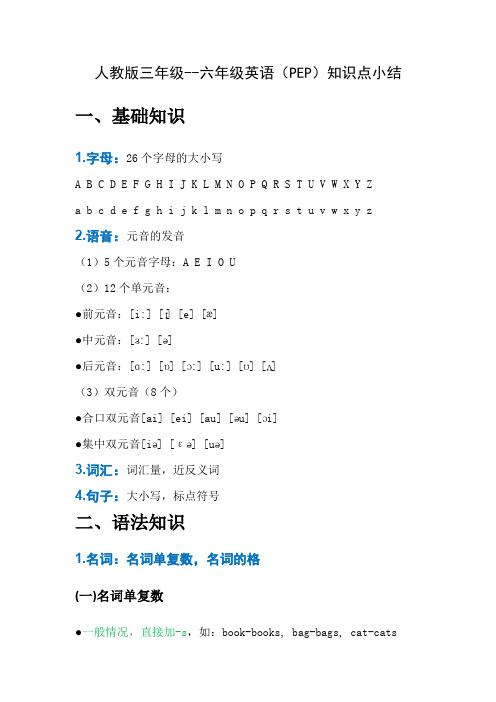
人教版三年级--六年级英语(PEP)知识点小结一、基础知识1.字母:26个字母的大小写A B C D E F G H I J K L M N O P Q R S T U V W X Y Za b c d e f g h i j k l m n o p q r s t u v w x y z2.语音:元音的发音(1)5个元音字母:A E I O U(2)12个单元音:●前元音:[i:] [ɪ] [e] [æ]●中元音:[ɜ:] [ə]●后元音:[ɑ:] [ɒ] [ɔ:] [u:] [ʊ] [ʌ](3)双元音(8个)●合口双元音[ai] [ei] [au] [əu] [ɔi]●集中双元音[iə] [εə] [uə]3.词汇:词汇量,近反义词4.句子:大小写,标点符号二、语法知识1.名词:名词单复数,名词的格(一)名词单复数●一般情况,直接加-s,如:book-books, bag-bags, cat-cats●以s. x. sh. ch结尾,加-es,如:bus-buses, box-boxes, brush-brushes, watch-watches●以“辅音字母+y”结尾,变 y 为 i, 再加-es,如:family-families, strawberry-strawberries●以“f 或 fe”结尾,变 f 或 fe 为 v, 再加-es,如:knife-knives 不规则名词复数:man-men,woman-women,policeman-policemen,policewoman-policewomen,mouse-mice,child-children,f oo t-f ee t,t oo th-t ee th,fish-fish,people-people,Chinese-Chinese,Japanese-Japanese不可数名词的复数就是原形:paper,juice, water, milk, rice, tea(二)名词的格(1) 有生命的东西的名词所有格:a) 单数后加 's如: Lucy's ruler, my father's shirtb) 以s 结尾的复数名词后加’如: his friends' bagsc) 不以s 结尾的复数后加's如:children's shoes并列名词中,如果把 's加在最后一个名词后,表示共有, 如:Tom and Mike's car 汤姆和迈克共有的小汽车要表示所有物不是共有的,应分别在并列名词后加's, 如:Tom's and Mike's cars 汤姆和麦克各自的小汽车(2) 表示无生命东西的名词通常用“of +名词”来表示所有关系:如: a picture of the classroom a map of China2.冠词:不定冠词,定冠词种类(1) 不定冠词:a / an ,元音开头的可数名词前用an :(2) 定冠词:the定冠词的用法:●特指某(些)人或某(些)物: The ruler is on the desk.●复述上文提到的人或物:He has a sweater. The sweater is new.●谈话双方都知道的人或物:The boys aren't at school.●在序数词前: John's birthday is February the second.●用于固定词组中: in the morning / afternoon / evening (3)不用冠词的情况:➢专有名词前:China is a big country.➢名词前有定语:this , that , my , your , some, any , no 等:This is my baseball.➢复数名词表示一类人和事:Monkeys can't swim. They are teachers.➢在节日,日期,月份,季节前:Today is Christmas Day. It's Sunday.➢一日三餐前:We have breakfast at 6:30.➢球类棋类运动前:They often play football after class. He plays chess at home.* 但乐器前要用定冠词:I play the guitar very well.➢学科名称前:My favorite subject is music.➢在称呼或头衔的名词前:This is Mr Li.➢固定词组中:at noon, at night, by bus3.代词、形容词、副词※代词:人称代词,物主代词※形容词,副词:比较级,最高级(一)、形容词的比较级1. 形容词比较级在句子中的运用:两个事物或人的比较用比较级,比较级后面一般带有单词 than。
- 1、下载文档前请自行甄别文档内容的完整性,平台不提供额外的编辑、内容补充、找答案等附加服务。
- 2、"仅部分预览"的文档,不可在线预览部分如存在完整性等问题,可反馈申请退款(可完整预览的文档不适用该条件!)。
- 3、如文档侵犯您的权益,请联系客服反馈,我们会尽快为您处理(人工客服工作时间:9:00-18:30)。
where,what colour, how many等的用法
在特殊疑问词的运用方面不够灵活。
3-5分
选择题;按实际情况回答问题。
情景对话
有关谈论购物,职业,日常活动及作息的话题。
对问价格的句子和it,them的使用;日常活动及作息的话题不熟练。
5-8分
选择题;选择句子把对话补充完整。
三至六年级英语知识点归纳总结
三年级上册英语
专题
考点
存在主要问题
分值比例
常见题型
字母
26个字母的大,小写和五个元音字母
26个字母的正确发音与前后顺序的记忆。
5-8分
填空题
名词
名词的单,复数形式
不能正确写出可数名词的复数形式,如:tooth-
teeth,mouse-mice.
8-10分
单词分类
介词
in,on,under等介词的用法
2-4分
选择题
形容词
形容词的用法
学生对一些形容词的近义词或反义词掌握不好
1-3分
填空题;选择题。
一般现在时态
动词的三单形式
主语为第三人称单数时,学生常常忽视了行为动词要变化
1-3分
选择题;选择正确的词填空。
时间的表达法
考查学生对时间的表达
学生对时间的表达容易和数词混淆
2-4分
填空题;听力题。
特殊疑问词
1-2分
选择题。
行为动词变化方式
一般现在时动词的第三人称单数;助动词,Don't;be going to后面的动词形式
学生常常对一般现在时态动词的三单形式掌握不透。
3-5分
选择题;用动词的适当形式填空。
听力
重要的单词,短语,句型。
听问题,选择正确的答语;听短文,判断句子的正误这两种题型是学生失分最多的。
不理解家谱的关系,不能写出正确的称呼。
2-3分
选择题;填空题。
形容词
Beautiful,old,pretty,tall,short,cute,strong,slim,long等形容词的正确运用。
难以区分tall和long,pretty和cute。
1-2分
选择题;填空题。
名词
名词的单,复数
中,差生对名词复数的不规则变化掌握不透。
40-50分
选择听到的内容;听句子,把所缺的单词补充完整;听问题,选择正确的答语;听短文,判断句子的正误。
单词
有关数词,月份,植物,动物,公共场所的单词。
学生对一些序数词,月份,公共场所的单词记忆不牢。
5-8分
单词分类;选择题;填空题。
句型
有关问路,谈论计划,日常生活等的句子。
学生在问路和指路的句子中易失分。
学生对可数与不可数名词难以区分。
3-5分
听力题;单词分类。
有关问天气的用语
问天气的句型和形容天气的词汇。
不能区分形容天气的词汇,如:windy,cloudy,rainy.
2-3分
选择题;看图写单词。
短语
each other,be
worried about,
do well in,have to等短语的灵活运用。
3-5分
选择题;看图写单词;用名词的正确形式填空。
近义词
some,any,have,has的用法。
学生常忽视了陈述句改为一般疑问句时,some要改为any。主语为三单时要使用has。
2-4分
选择题;填空题。
国家与国籍
国家与国籍名称的区分;国旗的区分。
难以区分国家与国籍的名称及国旗的标志。
2-3分
选择题;听力题;看图回答问题。
3-5分
用动词的适当形式填空;按实际情况回答问题;句型转换、就划线部分提问、变否定句、疑问句等;选择
日期,月份
日期的表达,十二个月份的掌握
中,差等生对日期的表达,月份的动词掌握不好
3-5分
选择题;填空题。
情态动词
Can的用法
句型转换;按实际情况回答问题.(学生易出错)
2-3分
句型转换;用所给单词连成句子;找出不同类单词;按实际情况回答问题。
3-5分
选择题;填空题
情景对话
日常问候语
中,差生对情景对话不够熟练,易失分。
5-8分
选择正确的句子完成对话。
单词
有关身体部分,学习文具,颜色,交通工具,数字的单词。
大部分学生对颜色,交通工具,数字的单词掌握不了。
8-10分
单词分类;听力题;看图写单词
句型
有关用特殊疑问词如:what colour, how many提问的句子,以及一般疑问句
近义词
other和others,
many,much和a lot of的用法。
学生常把other和others混淆。
1-2分
选择题。
有关看病的短语与用语
have a cold,
have a fever,
see a doctor等短语与用语。
中,差等生对短语会混淆。
2-3分
选择题;情景对话。
情态动词
can,should,need的用法。
2-3分
选择题;单词分类;看图写单词。
有关公共场所的名称
building,headmaster’s office,
library,playground,teachers’
room的区分。
对单词记忆不牢,难以区分各公共场合的名称。
2-3分
选择题;听力题;看图写单词;单词分类。
名词的所有格
名词单数与复数的所有格形式。
对特殊疑问句掌握不透,导致选择错误。
3-5分
按实际情况回答问题
听力
重要单词,短语,句子。
听句子,把所缺的单词补充完整这种题型最易失分。
40-50分
选择听到的内容;听句子,把所缺的单词补充完整。
三年级下册英语
有关家庭成员的称呼
husband,wife,brother,sister,uncle,aunt,son,daughter的记忆。
40-50分
选择听到的内容;听句子,把所缺的单词补充完整。
四年级下册英语
现在进行时态
动词的形式;句型转换。
对陈述句转换成一般疑问句掌握不透。
5-10分
听力题;选择题;按实际情况回答问题;用动词的正确形式填空。
一般现在时态
动词的三单形式
对动词的三单形式掌握不透
2-3分
选择题;用动词的正确形式填空。
名词
3-5分
选择题;按实际情况回答问题。
五年级上册英语
专题
考点
存在主要问题
分值比例
常见题型
一般现在时态
行为动词变化方式
主语为第三人称单数时,学生常常忽视了行为动词要变化
5-8分
选择题;用动词的适当形式填空;句型转换;阅读理解;写作。
数词
基数词与序数词:区别、拼写
用动词的适当形式填空;句型转换、就划线部分提问、变否定句、疑问句等。(学生易出错)
2-3分
选择题;看图写单词。
There be句型
there is与there are的用法。
学生常忽视了名词复数要用there are。
2-3分
选择题;按实际情况回答问题。
有关家庭各功能室的名称
kitchen,living room,bedroom,bathroom,study的区分。
对有关家庭各功能室的名称分不清,导致用词不当。
1-2分Βιβλιοθήκη 选择题。形容词interesting,boring,fun,great的正确运用。
对形容词的运用不够灵活。
1-2分
选择题;单词分类。
名词
名词的单,复数形式与不可数名词。
难以区分可数与不可数名词,对一些可数名词的复数形式掌握不透。
3-5分
选择题;单词分类;选词填空。
情景对话
邀请与购物用语。
对邀请与购物用语不熟练。
近义词
too,also,
either,still,yet的用法。
学生对also和either,
still和yet的用法会混淆。
1-2分
选择题。
冠词
a,an,the的用法。
在乐器前常忘了使用定冠词the,如:play the guitar.
1-2分
选择题。
名词的所有格
名词的所有格形式。
对无生命的名词所有格掌握不透,如:the pupils of Class One,a setter of a world record.
名词的单,复数形式。
以o结尾的名词,有生命的加es,无生命的加s。学生常忘记这一点。
3-5分
选择题;用名词的正确形式填空。
特殊疑问词
how old,
what,who,
which,how many,where,
what time,
how much的用法。
在特殊疑问词的运用方面不够灵活。
3-5分
选择题;填空题。
3-5分
选择题;选择正确的句子把对话补充完整。
短语
year(s) old,
listen to,be good at的灵活运用。
在大于数字1时,学生常忘了在year后面加s,be good at后面的动词常忘了改为ing形式。
2-3分
选择题;填空题。
句型
有关问年龄,运动的句子以及邀请和购物用语。
对句型不够熟练。
40-50分
选择听到的内容;听句子,把所缺的单词补充完整。
四年级上册英语
专题
考点
存在主要问题
分值比例
